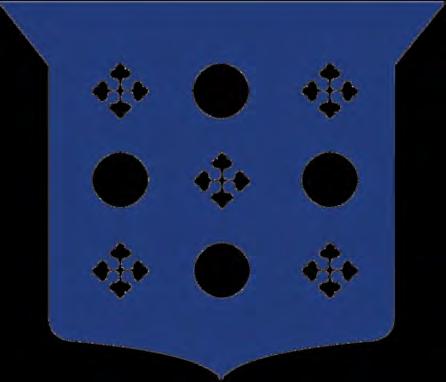PORTLEDGE UPPER SCHOOL COURSE DESCRIPTIONS
Each choice shapes the skills, passions, and opportunities that will guide your journey. Be bold, stay curious, and trust that growth comes from both challenges and exploration.


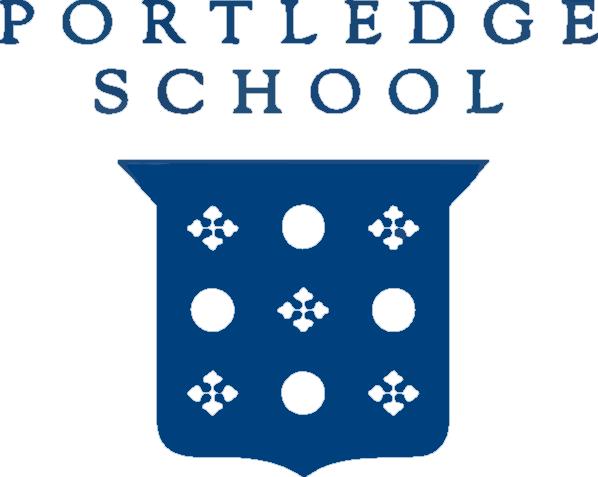


Each choice shapes the skills, passions, and opportunities that will guide your journey. Be bold, stay curious, and trust that growth comes from both challenges and exploration.





DearPortledgeUpperSchoolStudentsandParents:



ThisCatalogcontainsaroadmapofcoursesandofferingsforstudents in 9th through 12th grades. Course curriculums are designed by teachers who are experts in their subject matter, department chairs, and administrators meeting New York State, College Board, and International Baccalaureate standards where applicable. Lessons are composed to meet student needs while offering differentiated instruction,bothchallengingandsupportingstudentsintheirpursuit ofknowledge.
Student voice is valued in the classroom, and assessments are both formative and summative, with timely feedback provided by instructors to determine student understanding and encourage progress. Each department has established scope and sequence as briefly outlined in this document, setting up students for success as theymoveforwardintheirPortledgejourneyandbeyond.

Once enrolled in a course, you will find each course’s syllabus including grading criteria, rubrics, assignments, notes, lessons, and otherdetailsonmyPortledge.Forincoming/prospectivestudentsand families, please contact the Upper School office for additional informationandinsight.
Information concerning school policies and procedures can be found intheUpperSchoolStudentandParentHandbook.




“PortledgeisproudtobetheonlyprivateschoolonLongIslandtooffer the prestigious International Baccalaureate Diploma Programme. The IBpedagogyinspiresexemplaryteachingandmeaningfullearningthat alignswithPortledgeSchool’smissionofinstillingourstudentswithan authentic lifelong love of learning.” (Trish Rigg, IB Programme Coordinator). At the end of this document, you will find more information about the requirements necessary to acquire an International Baccalaureate Diploma, as well as details about how to achievespecialdistinctionsupongraduation,suchasS.T.E.A.M.,Visual, Performing, and Music Arts Scholars, and NY State Seal of Biliteracy. More information about the IB can also be found on our website: InternationalBaccalaureateatPortledgeSchool
Thecoursedescriptionsinthisdocumentareintendedtohelpstudents select courses for next year. Students are reminded that the school may withdraw any course described herein if the number of students signing up is insufficient, or if changes in personnel or scheduling difficulties preclude its being offered. If a course is oversubscribed, priority is given to the older students as much as possible within the constraints of scheduling. IB Diploma candidates are prioritized for IB courses. Every effort will be made to meet the student’s needs and interests.


Portledge School’s graduation requirements include the following during the Upper School years: 4 credits in English; 4 credits in Mathematics; 3 credits in Lab Sciences; 3 credits in History; 2 credits duringUpperSchoolyearsinFrench,Mandarin,orSpanish,culminating in at least level 3; at least one course in the Performing Arts and at leasttwocoursesfromamongVisualArtsandComputerScience,anda requirednon-creditcourseinHealth.Astudentneedstoearnatleast 18creditstoqualifyforgraduation.MostPortledgegraduatesearnfar in excess of that number in order to enhance college-acceptance prospects.
Students are expected to take a minimum of 5 credits each year. Lighter course loads must be approved in writing by the Director of UpperSchool.
We strongly encourage all students to enroll in a minimum of 7 credits per year, which is equivalent to 7 full-year classes (or other combinations of full-year and single-semester classes totaling 7 credits).Requeststotakemorethan7classesineithersemesterwill be reviewed on a case-by-case basis and must be approved by the DirectorofUpperSchool.

The 9th grade curriculum includes 5 core required credits (English, Mathematics, History, Science, and World Languages). Students are also encouraged to take at least one course from among the Visual Arts,PerformingArts,andComputerScienceareas.

The 10th grade curriculum includes 5 core required credits (English, Mathematics, History, Science, and World Languages) plus a noncredit required Health course. Students are also encouraged to take atleastonecoursefromamongtheVisualArts,PerformingArts,and ComputerScienceareas.
Any student enrolled in an Advanced Placement (AP) course is encouragedtotaketheAPexam.However,thosewhodonotwishto do so are permitted to opt out early in the school year. All AP studentswillsitforfinalexaminationsintheirclassesiftheychoose nottotaketheAPtest.

IB Courses are only for juniors and seniors. IB Diploma candidates must take all core courses in IB. Non-diploma candidates can elect IBcoursesdependinguponinstructorapprovalandavailablespace. Students enrolled in the IB Diploma are required to take all IB assessments.JuniorIBstudentsnottakinganIBassessmentintheir courses will take a final in all of their classes during the Upper SchoolFinalExamweek.
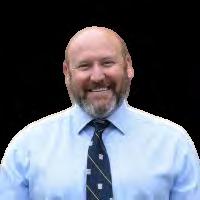
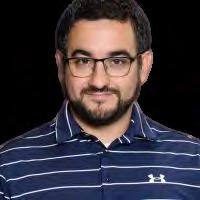
Chris Disimile Director of Upper School cdisimile@portledge.org
Francisco Lameiro
Assistant Director of Upper School, Dean of Faculty flameiro@portledge.org
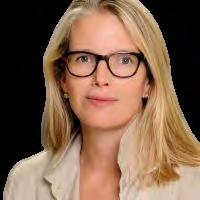

Trish Rigg
IB Programme Coordinator trigg@portledge.org
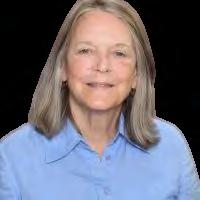
Susan Simon
Associate Director of Upper School, Registrar ssimon@portledge.org

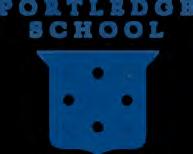
Our comprehensive range of courses is designed to equip students with the skills and knowledge needed to thrive in today's technology-driven landscape. From foundational principlestoadvancedapplications,ourcurriculumoffersadiverseselectionofclasses catering to beginners and seasoned enthusiasts. Through hands-on projects, collaborative learning, and innovative problem-solving, our courses empower students to develop a deep understanding of computer science concepts essential for our innovativeworld.
(9th, 10th, 11th, 12th - ½ cr/sem)
Prerequisite: Experience in computer programming is recommended. This course satisfies the engineering requirement for STEAM scholars. This course cannot be used to fulfill the 3-year lab science requirement. This one-semester elective course introduces students to the creation and use of artificial intelligence (AI). Students will learn about the history of AIs; their current implementations and applications in writing, art, music, and robotics; andthesocial,ethical,andpedagogicalimplications of anticipated developments. Students will use AIs to produce written documents and two-dimensional images. Students will build, train, and evaluate simple networks embodied in software (e.g., neural nets)orhardware(e.g.,swarmrobots).
(9th, 10th, 11th, 12th - ½ cr/sem)
Prerequisites: Algebra 1 or permission from the department.
Computer Science Principles (CSP) introduces students to the foundational concepts of computer science and challenges them to explore how computing and technology can impact the world. Rather than focusing the entire course on learning oneparticularsoftwaretoolorasingleprogramming language in-depth, the course is designed to focus on the conceptual ideas of computing and help students understand why certain tools or languages might be utilized to solve particular problems. CSP aims to develop in students the computational practices of algorithm development, problemsolving, and programming. Do you want to learn aboutCompScitopicsandbasicJavascripttobuild fun apps? This class is for you! Offered in the fall andspring.
(9th, 10th, 11th, 12th - 1 cr/yr)
Prerequisite: Algebra 1 or permission from the department. CSP or coding experience is recommended, but not required.
APComputerScienceA(CSA)introducesstudentstosoftwareengineeringandobject-orientedprogramming anddesignusingtheJavaprogramminglanguage.Thiscurriculumcoversabroadrangeoftopics,including thedesignofsolutionstoproblems,theuseofdatastructurestoorganizelargesetsofdata,thedevelopment andimplementationofalgorithmstoprocessdataanddiscovernewinformation,andtheanalysisofpotential solutions.Thiscoursewillpreparestudentstodevelopsoftwareskillsassociatedwithatext-basedcoding languageandtotaketheAPCSAexam(notrequired).Itwillalsobuilduponstudents’creativity,logic, problem-solving,projectplanning,andcollaborativeskills.Doyouwanttolearnmoreaboutobject-oriented, text-basedcoding?Comejointhisyear-longcourseexploringJava!
AnystudentenrolledinanAdvancedPlacement(AP)courseisencouragedtotaketheAPexam.However,those who do not wish to do so are permitted to opt out early in the school year. All AP students will sit for final examinationsintheirclasses,regardlessofwhethertheychoosetotaketheAPtest.
(11th, 12th - 1 cr/yr)
This course can be taken as part of the IB Diploma programme or as a single course.
Weare(in)adigitalsociety.Digitalsystemsare changingourworldandtransforminghowwethink, communicate,collaborate,andcreate.
This one-year course invites students to better understand our changing world and to imagine where we might go next. As partners in inquiry, students and teachers explore the impacts and implications of digital systems for people and communities in diverse real-world contexts. The passions,interests,andexperiencesofstudentsare centraltothecourse,whichaimstoempowerthem to become citizens who not only participate in digitalsocietybutleaditaswell.Areyouinterested inethicsanddebatingcurrenteventsrelatedtoour digitalsociety?Thiscourseisforyou!
(10th, 11th, 12th - 1 cr/yr)
Prerequisites: Robotics 1, parent permission to attend the FIRST Tech Challenge competition. This course cannot be used to fulfill the 3-year lab science requirement.
This course will continue to develop the student’s understanding of the engineering process and further explore programming languages—coding syntax,testing,anddebugging.Studentswillexpand their understanding of robotics using TETRIX, goBILDA, REV, and raw materials to construct mechanical elements. More focus will be placed on CAD skills in this course. Students in Robotics 2 willalsobeaskedtotakeonaleadershiproleinan area of specialization to help peers in the Robotics coursewhoarenewtoroboticsdesign,construction, and programming. In addition to class time, this course has some afterschool and weekend commitments, and a robotics competition in mid Januarythatstudentsareexpectedtoattend.

(9th, 10th, 11th, 12th - 1 cr/yr)
Prerequisite: parent permission to attend the FIRST Tech Challenge competition. This course cannot be used to fulfill the 3-year lab science requirement.
Students will design, build and program robots, applying real-world math and science concepts, following the engineering design process. This course develops problem-solving, organizational, and project management skills as teams compete in the yearly FIRST Tech Challenge competition. Students will learn about basic mechanical elements, the logic of coding a robot, and how to useCADtodesigncustomparts.Inadditiontoclass time, this course has 5-8 after-school and weekend commitments, and two robotics competitions in mid-January that students are expected to attend. Wanttolearnabouttheengineeringdesignprocess and how to build and code robots? Sign up for Robotics!
(11th, 12th - 1 cr/yr)
Prerequisites: Robotics 2, parent permission to attend FIRST Tech Challenge competition. This course cannot be used to fulfill the 3-year lab science requirement.
This course will continue to develop the student’s understanding of the engineering process and further explore programming languages—coding syntax,testing,anddebugging.Studentswillexpand their understanding of robotics using TETRIX, goBILDA, REV and raw materials to construct mechanical elements. More focus will be placed on advanced CAD skills, such as creating assemblies thatmove.StudentsinRobotics3willalsobeasked to take on small leadership roles in an area of specialization to help peers in the Robotics course who are new to robotics design, construction, and programming. In addition to class time, this course has some afterschool and weekend commitments, including two qualifier competitions in January, thatweexpectstudentstoattend.

(11th, 12th - 1 cr/yr)
Prerequisites: Robotics 3, parent permission to attend FIRST Tech Challenge competition. This course cannot be used to fulfill the 3-year lab science requirement. Atthislevel,studentswillbeexpectedtonotonly complete the designing, building, and coding of a robot, but also lead engineering design discussions, building and coding projects, and teams. Students willhelpmanagetheclassKanban(orotherproject management tools) and serve as the main documentation editor. Robotics 4 students will also assistinteachingCADskillstotheirpeerstogrow their communication skills. In addition to class time, this course has some afterschool and weekend commitments, including two qualifier competitions inJanuary,thatweexpectstudentstoattend.
(9th, 10th, 11th, 12th - ½ cr/1 Semester)
Website Design and Development introduces students to the foundational concepts of HTML5, CSS3, and JavaScript. Students will learn how to design websites with wireframing and then use VS Code to completely develop various website projects. No prior coding experience is needed. Do you want to learn how to build real websites completely from scratch? This class is for you! Offeredinthespringorfall.
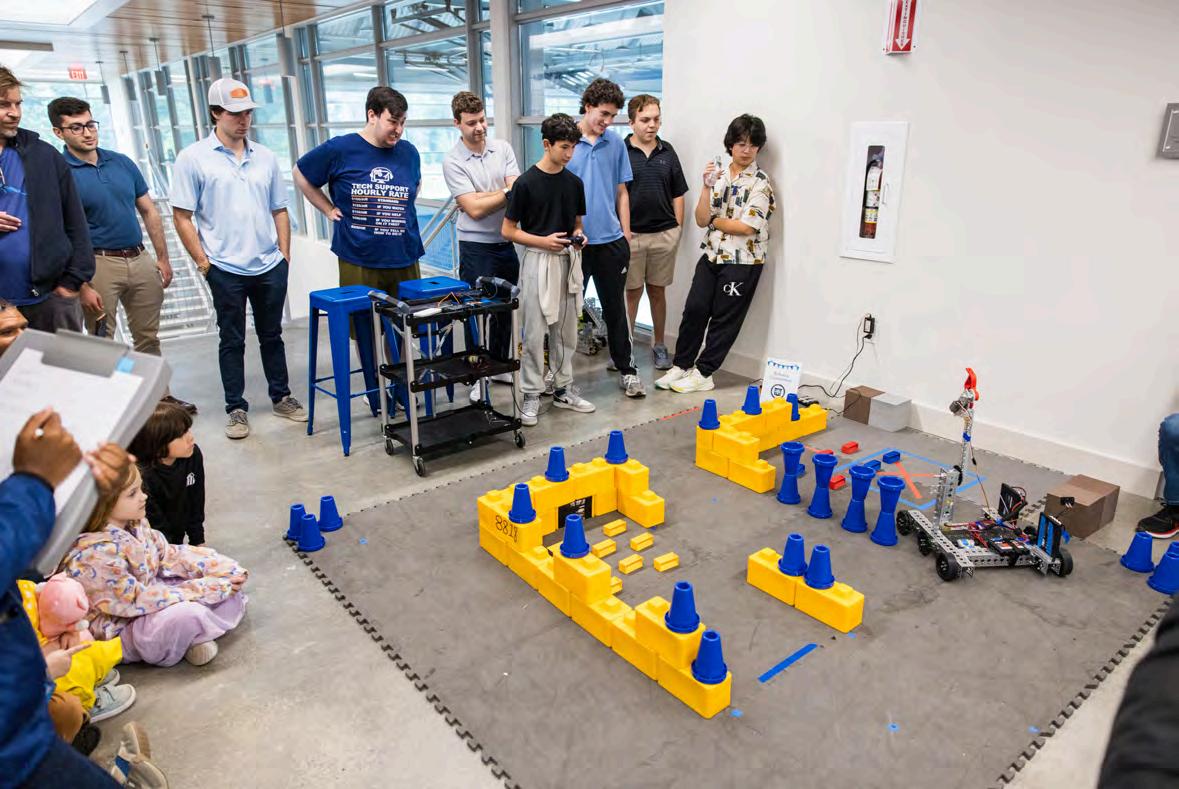

The English Department at Portledge is crafted to ignite a passion for literature, critical thinking, and effective communication. From analyzing timeless classics to exploring contemporary narratives, our curriculum encompasses a rich tapestry of literary works that will inspire and challenge you. Whether you're crafting eloquent essays, engaging in lively discussions, or honing your creative writing skills, our coursesofferaplatformforpersonalgrowthandintellectualexploration.
AppealProcess:
Each senior isrequiredtotake onecreditofEnglish,whichwill consistofIBEnglishYear2orat least2SeniorSeminars. *PleaseseethesectiononSenior Seminarsforcourseoptions.
Elective:
Crafting the Personal Narrative for College Applications & Beyond (11th)
Thiscoursecannotbeusedtosatisfyany portionofthe4-yearEnglishrequirement.
If a student wishes to enroll in an English course for which they have not been recommended,theymustcompletethefollowingsteps:
2.
Submit two graded English essays to the English Department Chair for review. Theseessaysshouldbeaccurateandrepresentativeexamplesofastudent’swritten andanalyticalskills.
1. Complete a timed written assessment administered by the English Department. It will measure the student’s knowledge of literary devices, annotation skills, and close-readingabilities.

(9th - 1 cr/yr) Required course. Prerequisite for English 9A: permission from the department. As students start their personal voyage into high school, this course will serve as an introduction to different literary genres and allow them to explore variousworksofliteraturesurroundingthethemeof self-discovery within the context of adventure and triumphs.Thecourseisstructuredtobuildonclose critical reading and effective writing skills while emphasizing literary analysis in a collaborative learning environment. Shared titles may include TheAbsolutelyTrueDiaryofaPart-TimeIndian and Anya’sGhost.Othertextsmayinclude TheHouseon Mango Street, The Catcher in the Rye, Rebecca, The Odyssey, We Have Always Lived in the Castle, and selectnonfictionspeechesfromdiversespeakers.
- 1 cr/yr)
English 11 continues the broad survey of literature begun in the tenth grade. Students focus on developing effective language skills by reading and writing about such works as Fahrenheit 451, The Great Gatsby, and A Streetcar Named Desire as well asshortstoriesandpoemsfromavarietyofcultural, racial, and gender perspectives. Students also experiment with various approaches to writing, includingcompare/contrast,formalliteraryanalysis, and close reading. In addition, they study contextspecific vocabulary, grammar, and usage rules in conjunctionwiththeirwriting.
(11th - 1 cr/yr)
Prerequisite: permission from the department. IB English Year 1 follows the first year International Baccalaureate Language A: Literature curriculum,whichoffersstudentstheopportunityto interactwithandcriticallyanalyzeawidevarietyof textsrepresentingdifferentgenres,themes,periods, styles, and cultural milieus. The reading may include ChronicleofaDeathForetold,1984,ADoll’s House,Blankets, and TheBluestEye, among others. StudentswhoarepursuingtheIBCertificateorthe IBDiplomashouldsignupforthisclass.
(10th - 1 cr/yr) Required course. Prerequisite for English 10A: permission from the department. Thepurposeofthecourseistocontinuetobuildon close critical reading and annotation skills as well as effective writing skills. Particular emphasis is placed on literary analysis. Vocabulary will be examined within the context of the literary selections. Titles studied in both 10 and 10A include Night, Lord of the Flies, and Macbeth. Selections in short stories and poetry will include workswrittenfromawidevarietyofcultural,racial, and gender perspectives. Students in 10A may also read The Adventures of Huckleberry Finn, Frankenstein,MyAntonia, or ARaisinintheSun.
(11th - 1 cr/yr)
Prerequisite: permission from the department. English 11A offers students the opportunity to interactwithandcriticallyanalyzeawidevarietyof textsrepresentingdifferentgenres,themes,periods, styles, and cultural milieus. The reading may include the intensive study of Fahrenheit 451, The Great Gatsby, A Streetcar Named Desire, Othello, Fences, and The Things They Carried, as well as short stories and non-fiction essays written from a variety of cultural, racial, and gender perspectives by such authors as Jonathan Swift, Frederick Douglass, Amy Tan, George Orwell, Chimamanda Ngozi Adichie, Richard Rodriguez, and Virginia Woolf.


(11th - ½ cr/sem)
This course cannot be used to satisfy any portion of the 4-year English requirement. Everyonehasastory—andoftenmorethanone—thatisworthtelling.It’sjustamatterofputtingtheright wordsintherightorder.(Easiersaidthandone!)Thiscoursewillaskstudentstoexplorethepitfallsand possibilitieswhenwritingaboutoneself.Theclassisdesignedforstudentsinterestedincompletingtheir personalstatementsandotherwritingrelatedtothecollegeapplicationprocess.However,itwillalsobenefit studentswhowishtocraftnarrativesthatexploretheirdistinctivestories.
Each senior is required to take one credit of English, which will consist of IB English Year 2 or at least 2 Senior Seminars:
(12th - 1 cr/yr)
Prerequisites: IB English Year 1, and permission from the department.
IB English Year 2 follows the second-year International Baccalaureate Language A: Literature curriculum.Buildingontheskillsandconceptsfrom IB English Year 1, students will interact with and critically analyze a wide variety of texts representing different genres, themes, periods, styles,andcultures.Majortextsmayinclude Fences, Twelfth Night, Narrative of the Life of Frederick Douglass, Things Fall Apart, The Things They Carried, and TheGreatGatsby,aswellasthepoetry ofSeamusHeaney.StudentswhoarepursuingtheIB CertificateortheIBDiplomashouldsignupforthis class.
½ cr/sem)
This course will target each element of storytelling and the process of writing—generating ideas, writing,editing,andpublishing.Studentswillfocus onthecraftofstudying,crafting,andworkshopping fictionalpieces.Throughouttheclass,studentswill cover several genres, including fiction, nonfiction, and poetry. As the course progresses, students will also explore reading and writing poetry in various forms, including written, spoken word, and music lyrics.Additionally,therewillbepotentialspaceto coverothergenresduringtheclass.Studentsinthis course will help in the production of Portledge Blossoms theliterary/artmagazine.
InthewordsofTa-NehisiCoates,"Poetryaimsforaneconomyoftruth."Aliteraryformthatpackssomuch profoundmeaningintotight,economicalpagespaceisoftenidealwhensharpeningone'sanalyticalskills. Beyondthat,though,poetryisalsoatime-honoredmediumthathasexistedinmanyforms—brieftoepic, structuredtofreeform,sometimesmusical,sometimesdramatic,sometimesevensacred.Thissurveycourse willexploretherichhistoryofpoetryasanartformaswellashowitiscraftedandanalyzed.Studentswill practicepoeticscansion,analyticalwriting,andcreativewritingastheytakethisdeepdiveintooneofthe world'smostbelovedmodesofexpression.

Each senior is required to take one credit of English, which will consist of IB English Year 2 or at least 2 Senior Seminars:
What scares us, and why? How much of our fears come from a primal place, and how much depends uponthecontextofwhatisfrighteningintheworld weseearoundus?Thiscourseaimstoexplorethose questions by tracing the evolution of horror media from the pivotal formation of the Gothic genre up to present-day horror hits. Students will read literature from various centuries and regions in order to see how horror media shifts across time, place,andsurroundingmindsets/schoolsofthought. Reading material will be supplemented with films, television, and internet media as these genres become relevant and revolutionary to the horror genre. We will discuss why tropes like the scary mansion and the family curse exist, what various creatures (vampires, werewolves, zombies, etc.) represent across varying media appearances, how horror can be based on the unfathomable or the mundane, and many more topics! By the end of the course, students will have experimented with the horror genre by completing a series of assessments, analyticalwritingassignments,andcreativewriting projects.

½ cr/sem)
Who are you, and how does that influence the relationships in your life? Authors from around the world and across the centuries have written about this topic, and this course will explore how their worksreflectvariousculturalunderstandingsofhow personalidentityimpactsloveandrelationships.By studying rich and diverse works of literature, we will investigate the complexities of identity, how relationship norms shift across cultures, and how creatorshavetriedtoemulateorrebelagainstsuch norms. This course will include nightly reading, ample class discussion, and both analytical and creative assignments that offer students a range of waystoengagewithclassmaterial.
Thepurposeofthiscourseistostudythecrossover betweenartandliterature.Wewillcoverarthistory and literature from ancient history through the realistic period by analyzing, interpreting, and creatingartworkbasedonfamousartthroughoutthe world. In addition to the artwork, students will learn about the many fascinating stories that inspired/were inspired by art. The course will include an emphasis on visual literacy, developing bothcriticalthinkingskills,andanappreciationof works of art and their stories. During the semester we will also take a class trip to the Metropolitan MuseumofArttoviewtheartworkwehavestudied. Students are not required to take both art history courses,buttheyarewelcometodoso.
Wewillanalyze,interpret,andcreateartworkbased on famous art throughout ancient history. We will cover Art History and Literature from the prehistoric era through the pre-modern period from aroundtheworld.
- ½ cr/sem)
Thepurposeofthiscourseistostudythecrossover betweenartandliterature.Wewillcoverarthistory and literature from the modern art period by analyzing, interpreting, and creating artwork based onfamousartthroughouttheera.Inadditiontothe artwork, students will also learn about the many fascinating stories that inspired/were inspired by art. The course will include an emphasis on visual literacy, developing both critical thinking skills, and an appreciation of works of art and their stories.Duringthesemesterwewillalsotakeaclass trip to the MOMA to view the artwork we have studied. Students are not required to take both art historycourses,buttheyarewelcometodoso.
Thepurposeofthiscourseistoappreciatethegenre of memoir through close examination of multiple shorterandlongerexamplesoftheform.Eachmajor work—Brain on Fire, The Glass Castle, Crime—explores the vibrant personal stories of authors from all walks of life. The texts explore universal themes, such as the role of a parent, the stigma of mental illness, and the effects of poverty and discrimination on a person’s life. Students will be assessed in a variety of ways designed to test their close reading, speaking, teamwork, and creative writing skills. These will include creating grouppresentationsandmini-lessons,writingformal literary analyses, and crafting shorter and longer personalnarrativesandmini-memoirs.

The purpose of this course is to explore how humanity can learn and grow from moral conflict. Each of the major works is thematically linked and presents complex ethical situations through the plights of the protagonists. Students will begin by studyingthehistoryofcautionarytalesinchildren’s literature, including analyzing several Brothers Grimm fairy tales as well as a deeper dive into the worldofspeculativefictionandsatire.Someofthe major texts include: Yellowface, The Lottery, The Perfect Match, The Handmaid’s Tale, 2Br02B, ‘Repent, Harlequin!’ Said the Ticktockman, Ponies, andselectepisodesof BlackMirror.Thesetextsvary in genre and include a group of diverse authors writing about a range of characters facing both uniqueanduniversalchallenges.Thetextsexamine moraldilemmas,suchastheroleofthegovernment initscitizens'lives,thehorrorsofblindlyfollowing tradition, and a friend and peer's moral responsibilities.
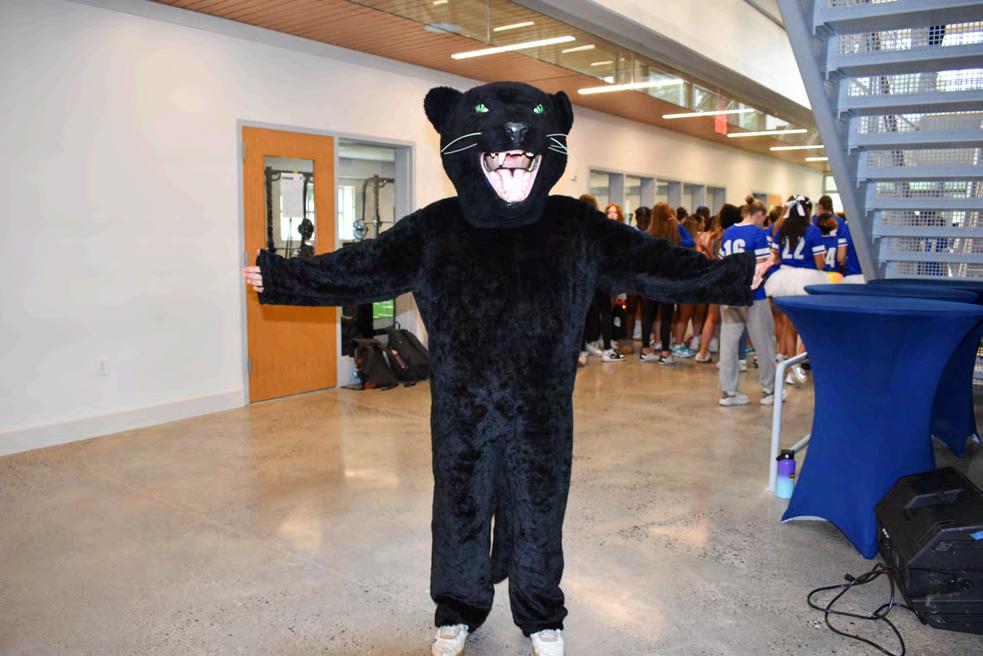

The History Department at Portledge is dedicated to encouraging students to think independently, make global connections, become citizens of the world, and understand the interconnectedness of societies and cultures. There is an emphasis placed on reading and evaluating sources while considering the lens of the period and the perspective of the figure or events. Through the study of a multitude of sources, students are empowered to think critically and become the next generation of leaders and problem solvers. Writing and communication skills are developed so students become adept at using evidence to support their points of view. Portledge history students recognize they canbecomeagentsforchange.
Electives:
AP Psychology (10th-12th)
IB Economics (11th-12th)
Modern Russian Studies (11th-12th)
IB World History (12th)*
Senior Seminars: Please see courses labeled Senior Seminars for options.
*This is a required course for IB Diploma Candidates in their senior year
Non-IBDiplomacandidatesonly
Requirestestingand/orapproval
If a student wishes to enroll in a history course for which they have not been recommended,thentheymustcompletethefollowingsteps:
1.
For the appeal to be considered, the student must first meet with their instructor to discuss their desire to join an advanced section.
If the student's concerns are not resolved, the student is to meet with the Department Chair to discuss the appeal process and schedule a placement exam.
The Department Chair will be responsible for developing and proctoring the exam. 3.
The student must complete a timed assessment (with accommodations as required), for which they will be provided content a week prior. This assessment will include multiple-choice questions, reading comprehension questions, and a written response. A grading rubric will be provided with the content regarding the students' written responses. Students must earn 85% or higher to be considered.
Placement test must be completed no later than Friday, April 25th, 2025.
(9th - 1 cr/yr)
The9th-gradehistorycoursewillrequirefreshmen tostudythecultural,economic,political,andsocial developments that have shaped the world from ClassicalAntiquitytotheriseofEuropeannationstates, from the Renaissance to the Age of Exploration to the Protestant Reformation. Great importancewillbeputintoanalyzingtexts,visual sources,andotherhistoricalevidence.Inaddition, students will learn to develop focused, wellstructuredessaysexpressingandanalyzinghistorical arguments.Emphasisisplacedondevelopingcritical and evaluative thinking skills. Participation is essential, as well as analyzing maps, art, and statisticalinformation.
Thisisasurveycourseofmajordevelopmentsthat shapedthegrowthofcivilizationaroundtheworld from the 1500s to modern times. To understand varyingperspectivesofeventswithinworldhistory, the curriculum will cover colonization and subjugationthroughouttheworld,thedevelopment of different systems of government, worldwide revolutions,andthepracticeofimperialism.Major emphasis is then given to the origins and global impact of the First World War and the rise of totalitarianstates.Inthesecondsemester,students arerequiredtocompletearesearchpaperunderthe guidance of the teacher and the librarian. They followastructuredresearchprocessandworkalmost entirelyinschool.
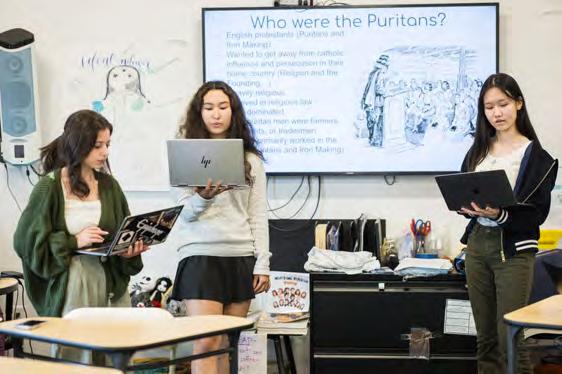

(9th - 1 cr/yr) 2-year course. Prerequisites: A- or higher in a current history course, 1 or 2 effort grade during the year. Year 1 of a two-year course leading to AP European History. Students who take this course are expected to complete the 2-year course.
The Advanced European History course for 9th gradeisrequiredforanystudentwhowantstotake APEuropeanHistoryinthe10thgrade,culminating inthemandatorytakingoftheAPEuroexamatthe endof10thgrade.(APEuropeanHistorywillbe offeredforthefirsttimeto10thgradersduringthe 2025-2026schoolyear.)
The9th-gradecoursewillrequirefreshmentostudy the cultural, economic, political, and social developments that have shaped the world from ClassicalAntiquitytotheriseofEuropeannationstates, from the Renaissance to the Age of Exploration to the Protestant Reformation. Great importancewillbeputintoanalyzingtexts,visual sources,andotherhistoricalevidence.Inaddition, studentsmusthavetheabilitytodevelopfocused, well-structured essays expressing and analyzing historicalarguments.
Studentsmusthaveastronginterestinhistory,be able to independently read and analyze historical documents, and make meaningful connections. Studentsmustentertheclasswiththeabilityto read and write fluid, well-developed essays using sources critically. Essays and assessments will be takenwithtimeconstraints.Activeparticipationis anessentialcomponentoftheclass,asemphasisis placedoncriticalandevaluativethinkingskillsand classdiscussions.Inaddition,studentswillhaveto interpretprimarysources,statistics,worksofart, andmaps.

AP
(10th - 1 cr/yr) Prerequisites: 9A Ancient & European, B- or higher, and teacher recommendation. Year 2 of a two-year course Studentsseekingtoenterthecoursewithouttaking theprescribedPre-APcoursemustfollowtheappeal process. In addition, summer work would be required.Studentswhotakethiscoursemusttake theAPExam.
AP European History is an introductory collegelevel European history course. Students will cultivatetheirunderstandingofEuropeanhistoryby analyzing historical sources and learning to make connectionsandcrafthistoricalargumentsasthey exploretheinteractionofEuropeandtheworld,as well as economic, commercial, cultural, and intellectualdevelopments.Inaddition,studentswill explore the evolution of nation-states and other institutionsofpower,socialorganization,national and European identity, and technological and scientificinnovation.Greatimportancewillbeput into analyzing texts, visual sources, and other historicalevidence.Inaddition,studentsmusthave theabilitytodevelopfocused,well-structuredessays expressing and analyzing historical arguments. Studentsmusthaveastronginterestinhistory,be able to independently read and analyze historical documents, and make meaningful connections. Studentsmustentertheclasswiththeabilityto read and write fluid, well-developed essays using sources critically. Essays and assessments will be takenwithtimeconstraints.Activeparticipationis anessentialcomponentoftheclass,asemphasisis placedoncriticalandevaluativethinkingskillsand classdiscussions.Inaddition,studentswillhaveto interpretprimarysources,statistics,worksofart, andmaps.
AnystudentenrolledinanAdvancedPlacement(AP) course is encouraged to take the AP exam. However, thosewhodonotwishtodosoarepermittedtooptout early in the school year. All AP students will sit for final examinations in their classes, regardless of whethertheychoosetotaketheAPtest.
Juniors are required to take United States History; History 11 and IB History of the Americas courses fulfill this requirement. The department will finalize sections.
This course covers both Domestic and Foreign Policy of the United States, including major political,economic,social,andculturaleventsfrom 1865through2000.Emphasisisplaceduponhoning skills such as analysis of primary and secondary sources, historical investigation, research skills, writtencommunication,aswellas,publicspeaking. Theadvancedsectionofthiscoursewouldcombine extensive primary and secondary works with the assignedtextsatanacceleratedpace.
Prerequisite: permission from the department. After completing IB History of the Americas, IB Diploma candidates will take IB World History in their senior year. Exams covering both years take place in May of senior year.
Thefirstofatwo-yearcourse,theHistoryofthe Americas,focusesonanin-depthinvestigationof varyingyetconnectingtopics.Throughouttheyear, studentswillstudyaspectsofhistory,withaheavy focusoncausationandcriticalanalysis.Threeindepthtopicswillbecoveredthroughouttheyear. The purpose of the course is to provide varying perspectivesregardingeventsthatshapedtheworld. By broadening the curriculum from the United States to one that encompasses both North and South America, students will gain a deeper appreciation for multiple perspectives and how interconnectedsocietytrulyis.
Inadditiontothecoursecontent,studentsshould be aware that this course focuses heavily on document analysis, compare and contrast style essays,andahistoricalinvestigation.Summerwork isexpected.
(11th, 12th - 1 cr/yr)
Prerequisite: Algebra 2.
IB Economics can also be taken as a stand-alone course elective. Availability is dependent on staffing and enrollment.
TheaimsoftheIBEconomicscourseattheSLlevel are to enable students to develop a critical understanding of a range of economic theories, models, ideas, and tools in the areas of microeconomics, macroeconomics, and the global economy;toapplyeconomictheories,models,ideas andtools,andanalyzeeconomicdata;tounderstand and engage with real-world economic issues and problems facing individuals and societies; and to develop a conceptual understanding of individuals’ and societies’ economic choices, interactions, challenges,andconsequencesofeconomicdecisionmaking.
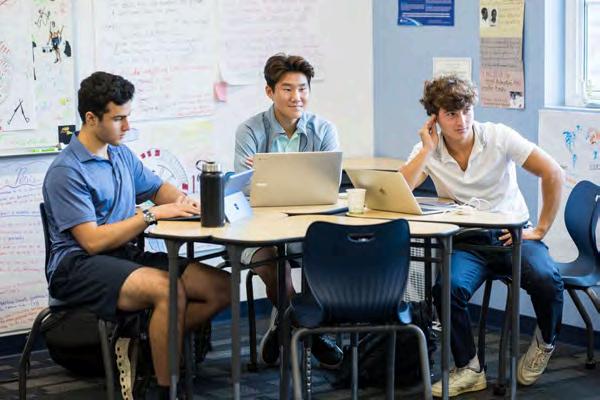

(12th - 1 cr/yr)
Prerequisite: IB History Year 1 (for IB Diploma candidates seeking HL designation). Permission from the department for non-IB Diploma candidates for 11th & 12th grades. IB Diploma candidates will have priority if space is limited. Non-IB Diploma candidates may also take IB World History in their senior year
Throughout this course, students will focus on specificcasestudiesregardingtheCauses,Practices, andEffectsofWar,leadingtoin-depthanalysis.In additiontothecasestudies,thecoursewillexamine twotopicsforgreaterunderstanding.Possibletopics include Authoritarian States (20th Century), and The Cold War: Superpower tension and rivalries (20th Century). The concentration of the two topicswillbedrivenbystudentinterestandteacher expertise. In addition to the course content, students should be aware that this course focuses heavilyondocumentanalysis,compareandcontrast style essays, and historical investigation. Summer workisexpected.
(10th, 11th, 12th schedule permitting - 1 cr/yr)
Prerequisite: rising 10th-graders must have the permission from the department.
Thecoursewillworktointroducestudentstothestudyofthebehaviorandmentalprocessesofhumanbeings andotheranimals.Studentswilllearnabouttheethicsandmethodspsychologistsuseintheirscienceand practice.Topicsofstudywillincludethehistoryofpsychology,researchmethods,biologicalunderstanding of behavior, sensation/perception, consciousness, learning, cognition, motivation and emotion, developmental psychology, personality, testing and individual differences, abnormal behavior and its treatment,andsocialpsychology(asdelineatedintheCollegeBoardAPPsychologyCourseDescription).
AnystudentenrolledinanAdvancedPlacement(AP)courseisencouragedtotaketheAPexam.However,those whodonotwishtodosoarepermittedtooptoutearlyintheschoolyear.AllAPstudentswillsitforfinal examinationsintheirclasses,regardlessofwhethertheychoosetotaketheAPtest.

(11th, 12th - ½ cr/sem)
This one-semester course is offered in the spring semester. Availability is dependent on staffing and enrollment.
ThiscoursesurveysRussiansociety'spolitical,social,andculturaltransformationfromtheperiodfollowing theRussianRevolutiontotheendofthe20thcentury.Theroleofkeyindividualsandeventsandthe evolutionofcertainideologiesthatshapedmodernRussianhistorywillbecovered.Thesetopicswillinclude theestablishmentoftheSovietUnion,theRussianCivilWar,theleadershipofJosephStalin,theroleofthe SovietUnioninWWII,theColdWar,thecollapseofcommunism,andthepost-SovietStateunderVladimir Putin.
(12th - ½ cr/sem)
Availability is dependent on staffing and enrollment.
Protestmovementsandactivismareentwinedin the history of the United States. At times, the spirits of protest and change coalesce around a specificeventandmanifestthemselvesinpopular culture.ThisclasswillexploreakeymomentinUS History where this occurred, the decade of the 1960s. Civil Rights, Women's Rights, and Anti VietnamWarprotestscametogethertocreatea decadeofupheaval,unrest,andchange.Students willreadandlistentomusic,interviews,andother mediasuchasvisualartandmoviestoexplorea fullunderstandingofthetimeperiod.
(12th - ½ cr/sem)
Availability is dependent on staffing and enrollment.
This course will be a combination of Art and Literature. We will analyze, interpret, and create artwork based on famous art throughout ancient history.WewillcoverArtHistoryandLiterature from the Prehistoric Era through the pre-Modern Periodfromaroundtheworld.Inadditiontothe artwork, students will also learn about the many fascinating stories that inspired/were inspired by art.Thecoursewillincludeanemphasisonvisual literacy, developing both critical thinking skills, and an appreciation of works of art and their stories.
(12th - ½ cr/sem)
Availability is dependent on staffing and enrollment.
This course will be a combination of Art and Literature. We will analyze, interpret, and create artwork based on famous art throughout modern history.WewillcoverArtHistoryandLiteraturein the Modern Period from around the world. In addition to the artwork, students will also learn about the many fascinating stories that inspired/were inspired by art. The course will includeanemphasisonvisualliteracy,developing bothcriticalthinkingskills,andanappreciationof worksofartandtheirstories.
(12th - ½ cr/sem)
Availability is dependent on staffing and enrollment.
Women in American History is a semester-long electivethatwillexplorethelivedexperiencesof womenintheUnitedStatesfrom1848throughto the 1970s, covering the political, social, and economiceventsfromTheSenecaFallsConvention throughtothefightforratificationoftheEqual Rights Amendment. Class resources and readings willbeselectedwithfemalewritersandhistorians centeredascreatorsandexperts.Studentsshouldbe enthusiasticallyinterestedinanopportunitytoread carefully, discuss thoughtfully, and write reflectively in a workshop-style class experience. Assessments will be varied, and a culminating biographicalresearchprojectwillbethefinal.

The Mathematics Department offers a variety of mathematics courses to meet the interests and needs of all students. The courses are designed to challenge, engage and prepare students for success in the future by developing mathematical problem-solving skills, knowledge, critical thinking and communication skills. Students are recommended to specific mathematics classes according to skill level which are determined by the mathematics teacher and student performance. All students are requiredtotakefouryearsofmathematics.
Ourgoalisthateachstudentisplacedinthemathcoursethatismostappropriatefor their learning needs as they move through the Upper School. For current Portledge students, subsequent class placement is determined by students’ performance and teacher recommendation in their current course. Students cannot retake a class that they have already passed. Departmental recommendations are based on student performance as well as student motivation, and ability to keep up with content. completingworkontime,attendance,skilllevel,retention,enthusiasmforthesubject, approachtolearning,participation,qualityofwork,andstudentinitiative.
Students who wish to advance their math path during their time at Portledge may enrollinthePortledgeSummerProgrammathematicscourses.Thesecoursesshouldbe taken on campus. Requests for other summer courses can be made to the Department Chair. Approval for other courses will be made on a case-by-case basis and advancement will be determined after evidence of completion of the online course is submitted to the Department Chair and a passing grade is earned on the course exam givenatPortledgeonthedesignatedtestingdate.Summercoursesaresubjecttochange based on enrollment, but the Summer 2025 Math offerings include: Algebra 1, Geometry,Algebra2,andPrecalculus.RegisterforSummerCourseshere.


Mathematics Academic Pathways
Calculus
AP Calculus AB
Statistics AP Calculus AB
Advanced Topics in Maths*
*AdvancedTopicsin Mathematicsmaybe offeredfollowingAP CalculusAB. Not offered in 2025-2026.
Requirestestingand/orapproval
AppealProcess:
Advanced Topics in Maths*
(9th,10th,11th,12th -½cr/sem)
If a student wishes to enroll in a Mathematics course for which they have not been recommended,theymustcompletethefollowingsteps: Successfulcompletionofaplacementtest 1. GainapprovaloftheDepartmentChair 2.
Offered during summer 2025 depending on enrollment and instructor availability. Algebra1isthestudyofthefundamentaloperations of algebra, introducing variables, algebraic expressions, equations, inequalities, functions, and multiplerepresentations.Inthisclass,studentswill develop the ability to explore and solve real-world application problems, demonstrate the appropriate use of graphing calculators, and communicate mathematical ideas clearly. This course lays the foundation for mathematical literacy that will help students succeed in every subsequent mathematics course.Majortopicsofstudyincludetheevaluation of algebraic equations, exponent rules and manipulation, polynomials, solving and graphing linear equations, solving and graphing two variable inequalities, solving systems of equations, radicals, word problems, solving and graphing quadratic equations,andfactoring.
Prerequisite: Algebra 1.
Offered during summer 2025 depending on enrollment and instructor availability.
Geometry continues students’ early study of geometricconceptsofshapesandsolidsandfocuses on the study of the properties of two and three dimensionalshapes;thesymmetry,congruence,and similarity of these shapes, and uses deductive reasoning and logical arguments in formulating directproofs.Studentswillacquireanddemonstrate knowledge of Euclidean geometry including basic definitions, postulates, theorems, and corollaries implementedthroughmathematicalmodeling.Major topicsofstudywillincludelogicalreasoningand formalproofs;propertiesoftriangles,quadrilaterals, andcircles;trianglesimilarity,trianglecongruence, andrighttrianglerelationships;analysisofareaand volume; properties of two and three-dimensional geometric figures and solids; and geometric constructionsandtransformations.

Prerequisites: Algebra 1 and entrance exam/permission from the department. Offered during summer 2025 depending on enrollment and instructor availability. Summer Geometry will not be labeled “Advanced” on the transcript
GeometryAdvancedisanin-depthformalstudyof Euclideangeometrythatissupplementedbytopics in analytic and transformation geometry, trigonometry,andalgebra.Emphasisisplacedupon developingbothanappreciationoftheaxiomatic structureofmathematicsandtheabilitytothink logicallythroughtheconstructionofformalproofs. Major topics of study include lines and angles, deductive reasoning, parallel and perpendicular linesandplanes,congruentandsimilarpolygons, congruent triangles, quadrilaterals, inequalities in triangles, circles, area and volume, constructions andloci,coordinategeometry,andtransformations.
Prerequisite: Geometry. Offered during summer 2025 depending on enrollment and instructor availability. Algebra 2 continues to develop the fundamental algebraicskillsneededforsuccessinhigher-level mathematics. Algebra 2 thoroughly studies functions, including parent functions, families of functions, and transformations. Students will developtheabilitytocreateandapplymodelsto situationsrepresentedbyfunctions.Thecontinued study of equations, systems of equations, inequalities, quadratics, factoring, and solving quadraticequationsbuildsonAlgebraIconceptsin greater depth as students work to define new functions.Majortopicsofstudyincludelinearand quadratic expressions, equations, and functions; polynomial, rational, and exponential functions; logarithmic functions, equations, and expressions; complex and imaginary numbers. Trigonometric conceptsinvolvingrighttrianglesarestudied,and laws involving non-right triangles are also introduced.

(1 cr/yr)
Prerequisites: Geometry with placement exam & permission from the department or Geometry A. Offered during summer 2025 depending on enrollment and instructor availability. Summer Algebra 2 will not be labeled “Advanced” on the transcript.
Algebra 2 Advanced is an intensive study of advancedalgebraandtrigonometrydesignedtogive students the necessary background for mastery of moreadvancedmathematics.Theemphasisisonthe structure of mathematical systems as well as on algebraic, computational, and problem-solving skills. Major topics of study include linear and quadratic expressions, equations, and functions; polynomial, rational, and exponential functions; logarithmic functions, equations, and expressions; complex and imaginary numbers, sequences, and series; conic sections, basic trigonometry and identities;probabilityandstatistics.
(1 cr/yr)
Prerequisite: Algebra 2.
Precalculusbuildsuponthestudent'sunderstanding ofalgebra,geometry,andmathematicalfunctions. Studentswilldevelopadeeperunderstandingofthe fundamentalconceptsandrelationshipsoffunctions while strengthening mathematical skills in preparation for Calculus. In addition to content mastery, students will further develop their problem-solving skills. Major topics of study include: functions and their graphs with special attention to polynomial, rational, exponential, logarithmicfunctions,trigonometricfunctions,and analytictrigonometry,complexnumbers;systemsof equationsandinequalities;trigonometricidentities; andtrigonometricapplications.
(1 cr/yr)
Prerequisite: Algebra 2.
Statistics will introduce students to the major concepts and tools for collecting, analyzing, and drawing conclusions from data. Major topics of studyincludeExploringData:Describingpatterns and departures from patterns, Sampling and Experimentation:Planningandconductingastudy, Anticipating Patterns: Exploring random phenomena using probability and simulation, Statistical Inference: Estimating population parametersandtestinghypotheses.
Prerequisites: Algebra 2 and placement exam & permission from the department or Algebra 2A. Offered during summer 2025 depending on enrollment and instructor availability. Summer Precalculus will not be labeled “Advanced” on the transcript.
AdvancedPrecalculuscompletestheformalstudyof functions and extends those ideas into advanced applicationsthatrequiremorecomplexcalculations. Studentswilldevelopadeeperunderstandingofthe fundamentalconceptsandrelationshipsoffunctions while strengthening mathematical skills in preparation for Calculus. In addition to content mastery, students will further develop their problem-solving and critical-thinking skills. Students are regularly challenged with tasks that require students to synthesize and apply concepts learnedthroughouteachunit.AdvancedPrecalculus isdesignedforthestudentwhohasastrongaptitude oraninterestinmathematicsand/orwhowillstudy calculus. Major topics of study will include fundamental concepts of algebra, polynomial equations of higher degrees, complex numbers, solving equations and inequalities, functions and graphs,polynomialfunctions,rationalfunctionsand functions involving radicals, exponential and logarithmic functions, trigonometric functions, systems and matrices, sequences and series, conic sections,probabilityandstatsandanintroduction tolimits.
(1 cr/yr) Prerequisite: Precalculus. Calculus focuses on developing and understanding of differential and integral calculus. Students will haveagoodfoundationforfurtherworkincalculus. Through the context of calculus, students will strengthen their skills in solving equations, graphing functions, and analyzing features of functions and their graphs. This course provides a review of polynomials, exponential, logarithmic, and trigonometric functions. Each family of functions will include an exploration of related limits, derivatives and integrals. Major topics of study will include: limits and derivatives of functions, definite and indefinite integrals, simple differential equations, and applications of these techniques in solving related rates of change, optimization, volumes of revolution, and exponentialgrowth.
(11th - 1 cr/yr)
Prerequisite: Algebra 2.
Thisisyearoneofatwo-yearrigorouscoursethat coversfivemainareasofstudy:algebra,functions, geometry and trigonometry, statistics and probability, and calculus. This course heavily focuses on applied mathematics and the use of a calculator.Standardlevelandhigherlevelarecoseated,soallstudentswillbetaughtandassessedon higherlevelmaterialduringYear1.ThisIBclass hasastrongeremphasisonstatisticsandthereforeis aimedatstudentswhowillgoontostudysubjects suchassocialsciences,naturalsciences,statistics, business,someeconomicscourses,psychology,and design.

(1 cr/yr) Prerequisites: Precalculus with a placement exam & permission from the department or Precalculus A.
AP Calculus AB is an introduction to the fundamental concepts and methods of differential and integral calculus with an emphasis on their application, and use of multiple representations incorporatinggraphic,numeric,analytic,algebraic, and verbal and written responses. This is an intensive,fast-pacedcoursethatpreparesstudents to take the Advanced Placement Calculus AB examination. Major topics of study include: functions; limits and their properties; analytic geometry; differentiation, applications of differentiation; integration, applications of integration; logarithmic, exponential, and other transcendentalfunctions.
AnystudentenrolledinanAdvancedPlacement(AP) course is encouraged to take the AP exam. However, thosewhodonotwishtodosoarepermittedtooptout early in the school year. All AP students will sit for final examinations in their classes, regardless of whethertheychoosetotaketheAPtest.
(12th - 1 cr/yr)
Prerequisite: IB Math Applications & Interpretations Year 1.
ThisrigorouscoursecontinuesthestudyfromYear1 inthefivemainareasofstudy:algebra,functions, geometry and trigonometry, statistics and probability, and calculus. This course heavily focuses on applied mathematics and the use of a calculator. Students will spend some class time workingontheinternalassessmentandpreparing fortheexam.ThisIBclasshasastrongeremphasis onstatisticsandthereforeisaimedatstudentswho willgoontostudysubjectssuchassocialsciences, natural sciences, statistics, business, some economicscourses,psychology,anddesign.

(11th - 1 cr/yr)
Prerequisite: Algebra 2A.
Thisisyearoneofatwo-yearrigorouscoursethat coversfivemainareasofstudy:algebra,functions, geometry and trigonometry, statistics and probability, and calculus. This course focuses on pure mathematics and problem-solving. Standard levelandhigherlevelareco-seated,soallstudents willbetaughtandassessedonhigherlevelmaterial duringYear1.ThisIBclasshasastrongeremphasis oncalculusandisthereforeaimedatstudentswho will go on to study subjects with substantial mathematics content such as pure mathematics, engineering,physicalsciences,andsomeeconomics courses.
cr/yr)
Prerequisites: Calculus AB and permission from the department.
Not offered in 2025-2026. Availability is dependent on staffing and enrollment.
This college-level course covers post-calculus AB materialatanintroductorylevel.Thecoursemay cover certain topics in Calculus C, Advanced Statistics, Multivariable Calculus, or Linear Algebra. Topics may include Paramentic, Polar, Vector functions, Infinite sequences and series, college-levelstatistics,PartialDerivatives,Multiple

(12th - 1 cr/yr)
Prerequisite: IB Math Analysis & Approaches Year 1.
ThisrigorouscoursecontinuesthestudyfromYear1 inthefivemainareasofstudy:algebra,functions, geometry and trigonometry, statistics and probability, and calculus. This course focuses on pure mathematics and problem solving. Students willspendsomeclasstimeworkingontheinternal assessmentandpreparingfortheexam.ThisIBclass hasastrongeremphasisoncalculusandistherefore aimedatstudentswhowillgoontostudysubjects withsubstantialmathematicscontentsuchaspure mathematics, engineering, physical sciences, and someeconomicscourses.
(9th, 10th, 11th, 12th - ½ cr/sem)
Prerequisite: Algebra 1.
Please note that this course is a math elective. Portledge School requires that students also include a primary math course in their schedule in addition to this math elective, as some colleges may not view this course as one of the traditional math courses required for admission. Availability is dependent on staffing and enrollment.
TheFinancialLiteracyclasswillteachthecritical money management skills that students need for everydayapplications.Fartoomanypeople,evena surprisingpercentageofthosewithsizableincomes, live paycheck to paycheck due to mishandling of theirmoney.Thisclassaimstofixthatbycovering a myriad of real-world topics that are extremely practical.Someoftheseskillsinclude:learninghow togetajob,payingtaxes,loans,credit,buyinga homevs.renting,buyingacar,retirementplanning, stocks,bonds,realestateandentrepreneurship.

The Music program at Portledge offers a diverse range of courses designed to immerse students in the transformative power of music, fostering creativity, expression, and a lifelongappreciationforthearts.Frommasteringinstrumentstoexploringmusictheory, our curriculum offers a harmonious blend of technical skill-building and artistic exploration.
(9th Grade Chorus - ½ cr/sem)
(10th, 11th, 12th - Concert Chorus - 1 cr/yr)
All students with a strong desire to sing as part of anensembleareencouragedtoparticipateinUpper School Chorus. The Concert Chorus will both perform in two major concerts per year, as well as theThanksgivingAssembly.Inadditiontolearning arepertoireofchoralliterature,studentswillstudy proper singing technique, sight singing, and will learn choral rehearsal and performance procedures. Special select groups may be formed within the choral ensembles as interest and ability warrant. Students are encouraged to re-enroll in chorus in subsequent years, as different literature will be studied.
(9th, 10th, 11th, 12th - 1 cr/yr)
Wind, percussion and string instrumentalists are offered the opportunity to advance their technical proficiency and to develop the skills necessary for ensemble playing. Rehearsals will be supplemented by in-school individual or group lessons. A variety of compositions, from classical arrangements to contemporaryworksandfilmscores,willbelearned and polished for performances during the school year, including winter and spring concerts. Small select ensembles may be formed for interested, able musicians. Students are encouraged to start in 9th gradeandcontinuethroughoutUpperSchool.
(9th, 10th, 11th, 12th - ½ cr/yr)
High-level orchestral musicians are offered the opportunity to learn to play in a more intimate settingandatevenhigherlevels,meetingwiththe Orchestrateachereither1-on-1orinsmallgroups onceaweek.Thechamberrepertoireselectedwill offer students more responsibility and independence.
(10th, 11th, 12th - 1 cr/yr)
Prerequisite: By audition or with department approval in the spring semester.
Theensemblewillstudyabroadrangeofmusical choralliteratureincluding,butnotlimitedto:20th Centurymusic,jazz,andAmericanfolk.Students willworktobuild4-partharmoniesandcomplex chords. The chorus will have the opportunity to performunaccompanied.Membersofthegroupwill strengthentheirreadingandlisteningskillswitha heavyemphasisonsight-singing.Theaccompanying exercises will enhance each student’s ability by providinganopportunitytounderstandthesound andfeelofeachinterval.TheSelectChoruswill performatthewinterandspringUSconcertswith thepossibilityofalsoperformingatotherevents throughout the year such as the Thanksgiving Assembly, End-of-Year Awards Ceremonies, and variousassemblies.
(9th, 10th, 11th, 12th - ½ cr/yr)
Prerequisite: NYSSMA level 5 (or department approval through audition).
Co-requisite: enrollment in the Band, Orchestra, or Chorus
Availability is dependent on staffing and enrollment.
Musicians interested in solo and small chamber music will practice their own repertoire both as soloistsaswellascollaboratewithothermusicians onarrangementscreatedspecificallyforthegroup based on individual instruments and skill levels. Musicianswillalsohaveaccesstopracticerooms during free periods to work on solo or chamber music in a collaborative way guided by a music teacher. There will be culminating performances throughout the year, as well as opportunities for performancebothonandoffcampus.

(9th, 10th, 11th, 12th - ½ cr/sem)
Availability is dependent on staffing and enrollment.
Studentswilllearnaboutvariousaspectsofaudio engineering, composition, and studio recording. Recordingstudiotechniquesandmusicproduction willbecoveredthroughprogramssuchasProTools andGarageband.Conceptsofmicrophoneselection, microphone placement, effects, recording, and mixing will be covered. Live audio set-up and productionwilloccurforvariouseventson-campus suchasconcerts,recitals,ormusicals,aswellasoffcampus occasions. Interested students must be available to set up and record at least two live performances in the spring semester (e.g. Coffeehouse,Blue&WhiteDay,Graduation,etc.)
(11th, 12th - 1 cr/yr)
Prerequisite: Music Theory & Survey or permission from the department demonstrating a strong understanding of music theory fundamentals.
Co-requisite: enrollment in the Band, Orchestra, Jazz Band, or Chorus.
Inthefirstyearofthistwo-yearcourse,students explore,experiment,andpresentmusic.Theywill alsolearnavarietyofvocabularyrelatedtomusic theorywhichtheyusetoanalyzeandwriteabout musicalcompositionsinfourAreasofInquiry(1) Sociocultural/political, (2) listening and performance, (3) dramatic impact, movement, entertainment, and (4) music technology in the digital age. Students prepare performances, compositions,research,andjournalingwithpieces from the mentioned Areas of Inquiry across 3 contexts that range from Personal (familiar) to Global (unfamiliar). The course will involve listeningtocompositionsandthenanalyzingtheir musical elements such as forms, instrumentation, and cadences. Students are expected to regularly practice their instruments as well as work with computerstohavearoundedunderstandingofmusic inallitscapacities.
(9th, 10th, 11th, 12th - ½ cr/sem)
Availability is dependent on staffing and enrollment.
Thiscourseisopentoallstudentswithaninterest inmusic,especiallythoseinterestedinIBMusic. Studentswillexaminetheroleandimportanceof music in our lives with a focus on the musical elementsusedtocreatetheworksstudied.Topics covered will include classical, jazz, popular, and theater music, music of other cultures, form in music,andmusictheory.Thecoursewillmakeuse of the Portledge Media lab and will include an introduction to music technology: students will learn the operation of the synthesizer, music sequencing, recording, and other skills involving musictechnology.Thisisanonperformingmusic course.Studentswillcompleteapaperonatopicin whichtheyhaveaspecialinterest.
(12th - 1 cr/yr)
Prerequisite: IB Music Year 1, Music Theory & Survey, or permission from the department. Co-requisite: enrollment in the Band, Orchestra, or Chorus.
Availability is dependent on staffing and enrollment.
Inthesecondyearofthistwo-yearcourse,students continuetoanalyze,create,andperformmusicin all contexts across the Areas of Inquiry. All studentswillapplytheirpracticeandresearchto severalportfolio-styleitemssuchaswritingprogram notes to accompany a performance, playing their instrumentinthestyleofanotherinstrument,and producingtheirownelectronicmusic.Allstudents will be assessed for the Exploration, Experimentation, and Presentation requirements. Additionally,HLStudentswilldevoteasignificant amountoftimetotheirContemporaryMusicMaker project, which is to realize an actual musical collaboration and present a 15-minute video explanation of the process along with a performance.

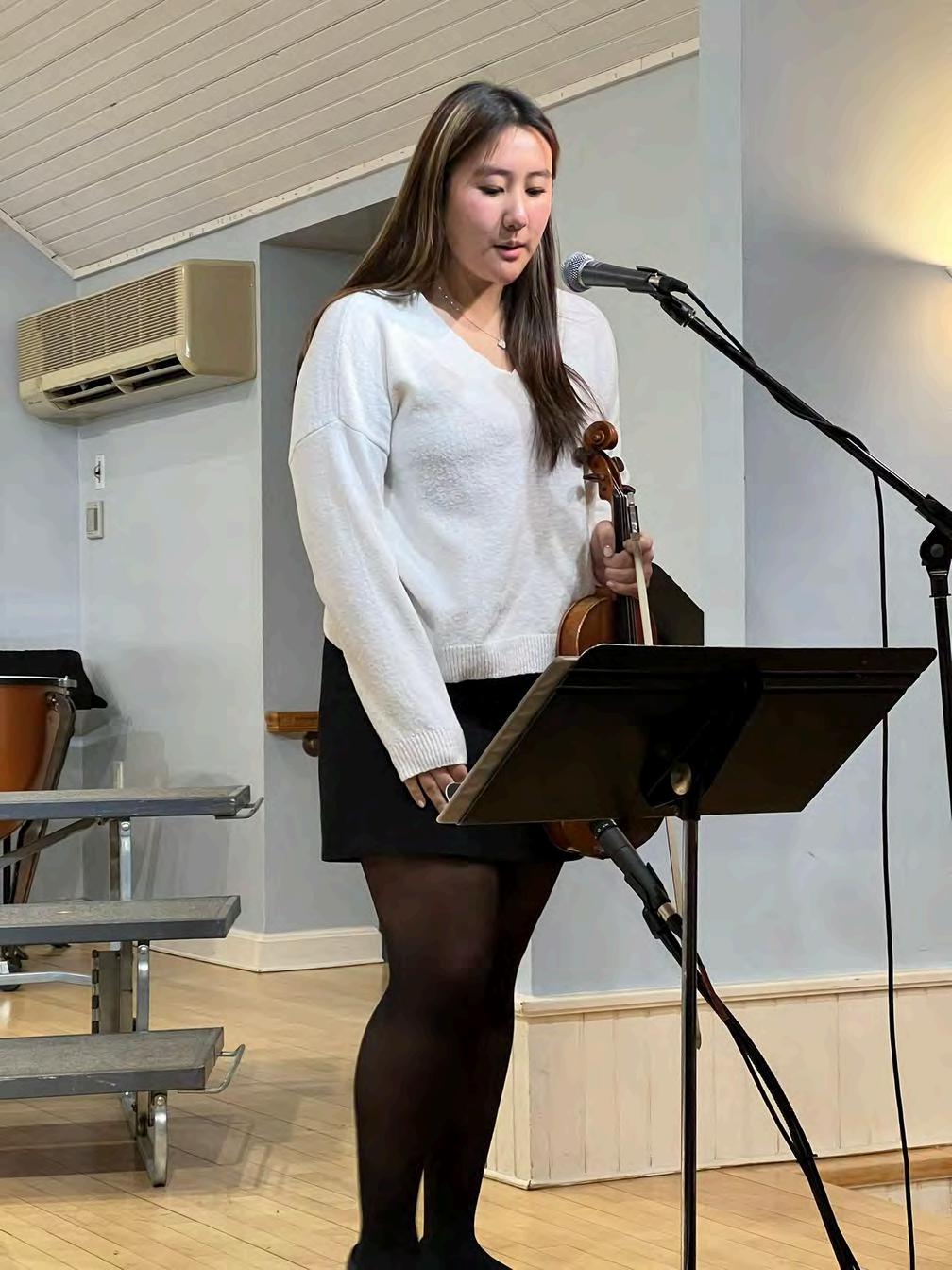
Jazz Combo
(9th, 10th, 11th, 12th - 1 cr/yr)
Prerequisite: By audition or with department approval in the spring semester.
JazzComboisopenbyauditiontothosestudents who play saxophone, trumpet, trombone, piano, guitar,bass,anddrums(otherinstrumentsmaybe considered by petition). Students must be taking private lessons currently on their instrument and must play at an intermediate level or higher (NYSSMAlevel5).Theensembleperformsclassic and modern jazz literature. Students will learn techniquesofimprovisationandwillworktowards playing together as a unit. The ensemble will performatthewinterandspringconcertsoncampus andwillhaveoff-campusopportunitiestoperformas well. Auditions will be held during the spring precedingtheschoolyearinwhichthecoursewill betaken.


All students must complete three years of laboratory science at Portledge School. The department determines placement in advanced and regular sections based on past performances in science classes, the recommendations of a student’s previous teacher, standardized test scores, and, depending upon the course, the student’s aptitude in mathematics. The department tries to identify the most able students for advanced classes which proceed at a faster pace and explore the subject material in greater depth with more abstract thinking. The usual laboratory sequence includes, in this order, courses in biology, chemistry, and physics. Additional science electives, IB, and AP courses may be available to students and vary from year to year based on student enrollment and staffing availability. Students are encouraged to take a science course eachoftheirfouryearsintheUpperSchool.
AppealProcess:
If a student wishes to enroll in a science course for which they have not been recommended,theymustcompletethefollowingstep(s):
ObtainapprovalfromtheDepartmentChair. 1.
*Students wishing to take AP Chemistry in grades 9 or 10 must take a placement examadministeredatPortledge. 2.

The following courses can be used to fulfill the 3-year lab science requirement.
(9th - 1 cr/yr)
A survey/laboratory approach covering a wide variety of topics in the life sciences, this course emphasizes the relationship between structure and function and the interrelationships among organisms. Topics include cells and cell biology, ecology,genetics,organismalbiology,evolutionand naturalselection.Animportantgoalofthecourseis the development of laboratory skills and scientific thinking. Labs are used to explore and reinforce concepts. The skills associated with application of conceptual knowledge and analytical data are introduced and practiced, with the intent to develop strong critical thinking skills and effective writtencommunication.
(9th - 1 cr/yr)
Prerequisites: Science 8A, permission from the department.
A survey/laboratory approach covering a wide variety of topics in the life sciences, this course emphasizestherelationshipbetweenstructureand function and the interrelationships among organisms.Topicsincludeallofthoselistedforthe standard Biology course. The course moves at a fasterpace,goesintogreaterdepth,andrequires more independent study skills. Students are expectedtohavestrongercriticalreadingskillsand are assessed on reading comprehension. An importantgoalofthecourseisthedevelopmentof laboratoryskillsandscientificthinking.Labsare used to explore and reinforce concepts. The applicationofconceptualknowledgeandanalytical data,alongwitheffectivewrittencommunication, are emphasized. Problem-solving and critical thinkingareusedinthiscourse,sostrongcritical readingandthinkingskillsareexpected.
(10th, 11th, 12th - 1 cr/yr)
Prerequisite: 1 year of Biology.
A laboratory course for students who want to understand the structure of matter, its properties, composition,andthechangesthatmatterundergoes withsomerelianceonmathematicalrelationshipsof chemical reactions. Topics will include the structure of the atom, chemical formulas, types of (and balancing) chemical reactions, phases of matter, gas laws, bonding, molecular geometry, intermolecular forces, stoichiometry, thermochemistry, and nuclear chemistry. The emphasis in this course will be on understanding concepts, although problem solving will require some basic algebra. Labs will provide hands-on experience for in-depth exploration of chemical laws and principles. Occasionally, technology will beintegratedintothelabexperiments.
(10th, 11th, 12th - 1 cr/yr)
Prerequisites: 1 year of Biology, Algebra 2 must be completed or taken concurrently, and permission from the department.
This laboratory course aims to develop an understandingofthebehaviorofsubstancesunder variousconditions.Topicsincludeallofthetopics listedforthestandardChemistrycourse.Thecourse movesatafasterpace,goesintogreaterdepth,and requires more independent study skills. Atomic structureandthebehaviorofelectronsareusedto investigate the properties of elements and to elucidate the nature of chemical bonds. Mathematical relationships during reactions, reaction rates, chemical equilibrium, acid-base reactions and redox chemistry are explored. An importantgoalofthecourseisthedevelopmentof laboratory skills. Labs are used to explore and reinforceconcepts.Problemsolvingisusedinthis course,sostrongmathematicalskillsareexpected, studentsshouldbeinAlgebra2oramoreadvanced math course. Occasionally, technology will be integratedintothelabexperiments.

(11th, 12th - 1 cr/yr)
Prerequisites: 1 year each of Biology & Chemistry.
This laboratory course is geared to students who want to increase their knowledge of the physical world without the use of advanced mathematics. Using a modeling approach this course will investigate the broad topic of mechanics. The coursewilladdressmovingwithconstantvelocity, uniformacceleration,behaviorofaparticlewhen the sum of the force acting on it equals zero, behavior of a particle subject to a net force, projectilemotion,uniformcircularmotion,energy storageandtransferandmomentum.Experimental work helps demonstrate the interrelationship betweentheoryandfact.
(11th, 12th - 1 cr/yr)
Prerequisites: 1 year each of Biology & Chemistry, Algebra 2 or higher.
Co-requisite: Precalculus.
This laboratory course is geared to students who want to increase their knowledge of the physical worldwiththeuseofAlgebra2,trigonometry,and some Calculus. Topics include all of the topics listed for the standard Chemistry course. This course moves at a faster pace, goes into greater depth and requires independent study skills. The development of quantitative analytical skills through mathematical problem-solving is emphasized. Laboratory experiments to apply conceptual knowledge will be performed. Critical thinkingaboutabstractconceptsisdeveloped.
(11th, 12th - 1 cr/yr)
2-year course.
Prerequisites: 2 years of Biology & Chemistry. IB Diploma and Course candidates who take this course are expected to complete the 2-year course sequence. Seniors can take this course with department approval.
Thiscollege-levelcourseprovidesin-depthcoverage ofthedisciplineofBiologyanddevelopsessential laboratory and analytical skills required for advancedworkinthefield.Studentsareempowered to make sense of living systems through unifying themes.Byprovidingopportunitiesforstudentsto exploreconceptualframeworks,theyarebetterable todevelopanunderstandingandawarenessofthe livingworldaroundthem.Thethemesforthefirst yearincludeunityanddiversity,formandfunction, andinteractionandinterdependence.Topicsforthe first year include properties of water, macromolecules, cell origin and structure, gas exchangeandtransport,speciationandadaptations, conservation of biodiversity, enzymes, photosynthesis, cellular respiration, and chemical

(12th - 1 cr/yr) 2-year course.
Prerequisite: IB Biology Year 1.

Thisisthesecondinatwo-yearcourseincollege-levelBiology.Studentsareempoweredtomakesenseof living systems through unifying themes. By providing opportunities for students to explore conceptual frameworks,theyarebetterabletodevelopanunderstandingandawarenessofthelivingworldaroundthem. Thethemesforthesecondyearincludethecontinuationofinteractionandinterdependence,andcontinuity andchange.Topicsforthesecondyearincludeintegrationofbodysystems,immunedefense,populationsand community,energyandmattertransfer,molecularbiology,reproductionandinheritance,naturalselection, andclimatechange.Withanemphasisonexperimentalwork,studentshaveopportunitiestoaskquestions, designexperiments,collectandanalyzedata,collaboratewithpeers,andreflect,evaluate,andcommunicate their findings. Field trips will expand student learning opportunities. The Internal Assessment will be completed during the second year and all students are strongly encouraged to complete the external assessmentsgivenbyIB.
(11th, 12th - 1 cr/yr)
2-year course.
Prerequisite: 2 years of US Science (at least one year of chemistry is strongly recommended).
IB Diploma and Course candidates who take this course are expected to complete the 2-year course sequence. Seniors can take this course upon department approval.
Thisisatwo-yearcourseinEnvironmentalScience designedtobetheequivalentofanIntroductionto EnvironmentalSciencecoursetakenduringthefirst yearofcollege.Thegoalofthiscourseistoprovide opportunities for students to study the scientific principles and concepts of environmental science and sustainability and to understand the interrelationships of the natural world, the processes that underlie the Earth, and the human dependence on ecosystem services. Students will identify and analyze natural and human-made problems, and examine and develop alternative solutions for resolving and/or preventing them. Topics for year one include foundations of ESS; ecosystems and ecology; biodiversity and conservation; atmospheric systems and societies; and, climate change and energy production. Work will include reading textbook material and current articles and conducting empirical studies, field work, laboratory experiments, case studies and projects. Field trips and experiential learning will beemphasized.
(12th - 1 cr/yr)
2 year course.
Prerequisite: IB ESS Year 1.
This is the second year of a two-year course in college-level Environmental Science. The goal of thiscourseistoprovideopportunitiesforstudents tostudythescientificprinciplesandconceptsof environmental science and sustainability and to understand the interrelationships of the natural world,theprocessesthatunderlietheEarth,and the human dependence on ecosystem services. Students will identify and analyze natural and human-made problems and examine and develop alternativesolutionsforresolvingand/orpreventing them.Topicsforthesecondyearincludewaterand aquaticfoodproductionsystemsandsocieties;soil systems, terrestrial food production systems and societies;andhumansystemsandresourceuse.The InternalAssessmentwillbecompletedduringthe second year. Work will include reading textbook material and current articles and conducting empirical studies, field work, laboratory experiments,casestudiesandprojects.Fieldtrips andexperientiallearningwillbeemphasized.The InternalAssessmentwillbecompletedduringthe secondyearandallstudentsarestronglyencouraged tocompletetheexternalassessmentsgivenbyIB.

(11th, 12th - 1 cr/yr)
2-year course.
Prerequisites: Advanced Chemistry, Algebra 2, or higher.
IB Diploma and Course candidates who take this course are expected to complete the 2-year course sequence. Seniors can take this course upon department approval.
As one of the three natural sciences in the IB DiplomaProgramme,physicsisconcernedwithan attempt to understand the natural world. This algebra-based course explores space, time and motion, the particulate nature of matter, wave behavior,fields,andnuclearandquantumphysics, as well as mathematical, experimental, data analysis,andmodelingtools.Thiscoursemayalso betakenbynon-IBstudents.
(12th - 1 cr/yr)
2-year course.
Prerequisites: IB Physics Year 1 & Algebra 2. Thiscourseisasecondyearofatwo-yearsequence coveringimportantprinciplesofphysicsindepth through problem solving and laboratory experiments. It is designed to meet the needs of those students wishing to further their study of physics.TheInternalAssessmentwillbecompleted duringthesecondyearandallstudentsarestrongly encouraged to complete the external assessments givenbyIB.
Years 1 & 2
(11th, 12th 1 cr/yr)
2-year course.
Prerequisite: 2 years of Upper School Science (Biology strongly recommended).

IB Diploma and Course candidates who take this course are expected to complete the 2-year course sequence. Seniors can take this course upon department approval; priority is given to IB Diploma students and juniors who wish to complete the IB Course certificate. Availability is dependent on staffing and enrollment.
TheSports,Exercise,andHealthScience(SEHS) Standard Level course offers an interdisciplinary exploration of how physiological, biomechanical, andpsychologicalprinciplesinfluencehumanhealth and athletic performance. This two-year program blendsacademicstudywithpracticalinvestigative skills,engagingstudentsinlaboratoryandfieldwork activities.Keythemesincludeexercisephysiology, biomechanics,andsportspsychology,withafocus onhealthandperformanceapplications.Thecourse emphasizes inquiry-based learning and the integrationofscientificconcepts,fosteringcritical thinkingandanalyticalskills.Studentswilldevelop astrongfoundationinexperimentaltechniquesand data analysis while exploring the ethical, environmental, and social implications of sports science. This course is particularly relevant for students interested in pursuing careers or further educationinhealth,fitness,orsports-relatedfields.

(10th, 11th, 12th - 1 cr/yr)
Prerequisites: 2 years of Upper School Science: Biology & Chemistry & Algebra 2, and/or permission from department.
APChemistryisdesignedtobetheequivalentof the general chemistry laboratory course taken duringthefirstyearofcollegeforstudentsplanning to major in science. Topics will include atomic theory and atomic structure, chemical bonding, gasses,liquidsandsolids,solutions,reactiontypes, stoichiometry, equilibrium, kinetics, thermodynamics, and electrochemistry. All topics will be covered with an emphasis on chemical calculations and mathematical formulations of chemical principles. Proficiency in the use of logarithmic and exponential relationships is expected and therefore it is necessary that the studenthavesuccessfullycompletedasecond-year algebra course. In addition, students will be required to maintain a thorough, well-organized laboratory notebook in such a fashion that chemistry professors at the students’ selected institutionscanreadilyreviewthisevidenceoftheir labexperiences.Technologywillbeintegratedinto the lab experiments. Students will take the ChemistryAPexaminMay.
AnystudentenrolledinanAdvancedPlacement(AP) course is encouraged to take the AP exam. However, thosewhodonotwishtodosoarepermittedtooptout early in the school year. All AP students will sit for final examinations in their classes, regardless of whethertheychoosetotaketheAPtest.
(12th - 1 cr/yr)
Prerequisites: Algebra 1 & 3 years of Upper School Lab Science.
Availability dependent on staffing and enrollment.
Astrophysicsisthescientificdisciplinededicatedto thestudyofthephysicalnatureofstarsandother celestialbodies,andtheapplicationofthelawsand theories of physics to the interpretation of astronomical observations. Topics to be covered include: The Solar System, Big Bang Theory, propertiesofstars,stellarevolution,theinterstellar medium, galaxies, Hubble's Law, cosmology, observational astronomy, the history and development of astronomy, Kepler's laws of planetary motion, Newton's laws of motion and gravity,theEarth-moonsystem,thestructureand composition of the planets with an emphasis on comparative planetology, asteroids, comets, the formation of the solar system, the sun and the exploration of space. Emphasis is placed on investigatingthemethodsastronomersusetolearn abouttheuniverse.Knowledgeofbasicalgebraand Earthscienceskillsareassumed.Studentsmayhave an opportunity to gain some college experience during lessons taught by a local university astronomyprofessorand/orvisitalocaluniversity's astronomylabandusetheirhighpoweredtelescopes forstargazing.
(12th - 1 cr/yr)
Prerequisites: 1 year of Biology and 1 year of Chemistry.
Human Anatomy and Physiology is a course for those students interested in science-related fields. Anatomy andphysiologyisadiscussionandlaboratorybasedstudyofthehumanbody.Thestudywillincludemolecules, cells, body systems and body processes. Dissection will complement course work. This course is designed for students interested in potentially pursuing biology and health career majors. The course will provide opportunities for students to investigate topics of interest, to conduct experiments, and to develop critical thinking and communication skills. This is a full year course centered around the following topics: Basic Chemistry, Cells and Tissues, Skin and Body Membranes and Body Systems (Skeletal, Muscular, Nervous, Endocrine,Cardiovascular,Lymphatic,Respiratory,Digestive,UrinaryandReproductive).

(12th - 1 cr/yr) Prerequisites: 1 year of Biology & Chemistry. Availability is dependent on staffing and enrollment. Thiselectivecourseisdesignedtoprovideacomprehensiveexplorationofthemarineenvironment,bringing togetheroceanographyandmarinescience.Studentswilldevelopanunderstandingofecologicalprinciplesas theyexaminethephysicalstructureanddynamicsofmarineecosystems.Thecoursecoversarangeofmarine life,frommicrobestocomplexchordates.Throughengagingcourseworkandhands-onactivities,studentswill developessentialskillsinobservation,dataanalysis,problemsolving,andscientificcommunication.Above all, this course aims to foster a deeper understanding and appreciation of marine ecosystems, promoting a genuinerespectforthediversityoflifeformsandprocessesinourocean.
The following courses cannot be used to fulfill the 3-year lab science requirement.
(9th, 10th, 11th, 12th - 1 cr/yr)
Prerequisite: parent permission to attend the FIRST Tech Challenge competition. This course cannot be used to fulfill the 3-year lab science requirement. Students will design, build and program robots, applying real-world math and science concepts, following the engineering design process. This course develops problem-solving, organizational, andprojectmanagementskillsasteamscompetein the yearly FIRST Tech Challenge competition. Students will learn about basic mechanical elements,thelogicofcodingarobot,andhowto useCADtodesigncustomparts.Inadditiontoclass time,thiscoursehas5-8afterschoolandweekend commitments,andtworoboticscompetitionsinmid Januarythatstudentsareexpectedtoattend.Want tolearnabouttheengineeringdesignprocessand howtobuildandcoderobots?SignupforRobotics!
(10th, 11th, 12th - 1 cr/yr)
Prerequisites: Robotics 1, parent permission to attend the FIRST Tech Challenge competition. This course cannot be used to fulfill the 3-year lab science requirement. Thiscoursewillcontinuetodevelopthestudent’s understanding of the engineering process and further explore programming languages—coding syntax,testing,anddebugging.Studentswillexpand their understanding of robotics using TETRIX, goBILDA, REV and raw materials to construct mechanicalelements.Morefocuswillbeplacedon CADskillsinthiscourse.StudentsinRobotics2 willalsobeaskedtotakeonaleadershiproleinan areaofspecializationtohelppeersintheRobotics coursewhoarenewtoroboticsdesign,construction

(11th, 12th - 1 cr/yr)
Prerequisites: Robotics 2, parent permission to attend FIRST Tech Challenge competition. This course cannot be used to fulfill the 3-year lab science requirement.
Thiscoursewillcontinuetodevelopthestudent’s understanding of the engineering process and further explore programming languages—coding syntax,testing,anddebugging.Studentswillexpand their understanding of robotics using TETRIX, goBILDA, REV and raw materials to construct mechanicalelements.Morefocuswillbeplacedon advanced CAD skills, such as creating assemblies thatmove.StudentsinRobotics3willalsobeasked to take on small leadership roles in an area of specializationtohelppeersintheRoboticscourse whoarenewtoroboticsdesign,constructionand programming.Inadditiontoclasstime,thiscourse has some afterschool and weekend commitments, including two qualifier competitions in January, thatweexpectstudentstoattend.
(9th, 10th, 11th, 12th - ½ cr/sem)
Prerequisite: Experience in computer programming is recommended. This course satisfies the engineering requirement for STEAM scholars. This course cannot be used to fulfill the 3-year lab science requirement.
This one-semester elective course introduces students to the creation and use of artificial intelligence (AI). Students will learn about the historyofAIs;theircurrentimplementationsand applicationsinwriting,art,music,androbotics;and thesocial,ethical,andpedagogicalimplicationsof anticipateddevelopments.StudentswilluseAIsto produce written documents and two-dimensional images. Students will build, train, and evaluate simplenetworksembodiedinsoftware(e.g.,neural nets)orhardware(e.g.,swarmrobots).

(11th, 12th - 1 cr/yr)
Prerequisites: Robotics 3, parent permission to attend FIRST Tech Challenge competition. This course cannot be used to fulfill the 3-year lab science requirement.
Atthislevel,studentswillbeexpectedtonotonly completethedesigning,buildingandcodingofa robot,butalsoleadengineeringdesigndiscussions, buildingandcodingprojects,andteams.Students willhelpmanagetheclassKanban(orotherproject management tools), and serve as a main documentationeditor.Robotics4studentswillalso assistinteachingCADskillstotheirpeerstogrow their communication skills. In addition to class time,thiscoursehassomeafterschoolandweekend commitments,includingtwoqualifiercompetitions inJanuary,thatweexpectstudentstoattend.
(9th, 10th, 11th, 12th - ½ cr/sem) May be repeated in multiple years. This course cannot be used to fulfill the 3-year lab science requirement.
Studentswillidentifyatopicofinterest,learnhow to read and analyze primary source research papers, develop the business etiquette for approaching professionals in the field of interest to initiate discussions, prepare a detailed research proposal, plan research methods and analysis, carry out studies, analyze results, and prepare a professional stylemanuscriptdescribingtheirfindings.
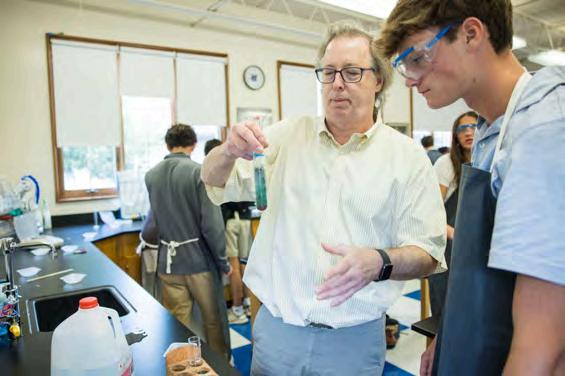

From the stage to behind-the-scenes, our curriculum provides a comprehensive explorationoftheatre,allowingstudentstodevelopessentialskills,gainconfidence,and discover their unique voice in the world of dramatic arts. Whether you're drawn to acting, directing, technical production, or the rich history of theatre, our courses provide a platform for personal growth, collaboration, and a deeper understanding of the powerfulimpactofliveperformance.
(9th, 10th - 1 cr/sem)
This one-semester course is offered in the fall semester. Class limit - 20 students.
Fulfills Performing Arts requirement.
Thisisanintroductorycoursedesignedforstudents to learn beginning acting technique, theory, and basic theatre appreciation and terminology. Fundamentals covered are basic theatre knowledge, history of acting practitioners and playwrights, improvisation, devising techniques, scene work and other performing exercises designed to lay the groundwork for future theatre training in this program. This beginning course will focus on the PROCESSandhelpdeveloptheskillsandemotional freedom to explore and create characters. This is a performance class and all students will perform a two person scene final in this class. Theatre is collaborative in nature and students interested in this course must be willing to be a positive and supportivememberofthisclassandprogram.
(9 th, 10th - 1 cr/sem)
Prerequisite: Intro to Theatre is strongly encouraged.
This one-semester course is offered in the spring semester. Class limit - 20 students. Fulfills Performing Arts requirement.
CreativeDramaticsisacoursedesignedforstudents to learn advanced acting techniques, theory, and theatre appreciation and terminology needed to grasp the concepts of acting and creative performance.Fundamentalscoveredaremonologues, improvisation, scene/character work, and public performancesdesignedforfuturetheatretrainingin this program (IB Theatre). This is a performance class. Students will be asked to read, analyze, and perform plays in class and possibly for the public. Students will also be asked to collaborate, create, and perform theatre pieces based on Devised Theatre techniques such as Theatre for Change, Theatre of the Oppressed, and Process Drama. Theatre is collaborative in nature and students interested in this course must be willing to be a positiveandsupportivememberofthisclass.
(9th, 10th, 11th, 12th - 1 cr/sem)
This one-semester course is offered in the spring semester. Class limit - 20 students. Fulfills Performing Arts requirement.
TechnicalTheatreisaclassdesignedforstudentstolearnaboutputtingtogetheratheatricalproductionand other performance events through a detailed look at backstage and technical elements of production. This classisintendedforstudentswhoarecuriousaboutproduction,butarenotinterestedinaperformancebased class. The knowledge will be put to use in practical ways, supporting and helping create various school performances, while learning how to be part of the performing arts community. Students must be willing to engage in elements covered, such as stage lighting, sound, stage management and running crew, and to participateinprovidingsupportoutsideofclassperformancesandevents.Studentswillleavethiscoursewith a basic understanding of the subjects, demonstrating the ability to use technical vocabulary, learn safety protocols, performance etiquette and give students skills and confidence to work and assist in various performanceandeventsettings.Theatreiscollaborativeinnatureandstudentsinterestedinthiscoursemust bewillingtobeapositiveandsupportivememberofthisclassandprogram.
IB Theatre Year 1 (11th - 1 cr/yr)
Prerequisite: Intro to Theatre, Creative Dramatics or Technical Theatre is strongly recommended. This class cannot be used to fulfill the Performing Arts requirement.
StudentsintheirfirstyearofIBTheatresignupfor this section. This a two-year advanced course and part of the IB Diploma programme. Students are requiredtoexploreTheatrefromtheperspectiveof dramaturg, director, performer, group ensemble, production team and spectator. Assessments are completedinthesecondyearofstudy,withthefirst year focused on gaining knowledge and understanding about the topics and preparing for assessments.
IB Theatre Year 2 (12th - 1 cr/yr)

(10th, 11th, 12th - 1 cr/yr)
Prerequisites: Intro to Theatre, Creative Dramatics, or Technical Theatre, and permission from department. This class cannot be used to fulfill the Performing Arts requirement.
AdvancedTheatreisanadvancedcourseandwillbe taught concurrently (i.e. in the same time and place) with IB Theater. Students enrolled in this course will be involved with all aspects of the IB course and participate in IB Year 2 Diploma candidate projects. Students may take this course twice.YeartwostudentsaredesignatedasAdvanced Theatre2.
(11th, 12th - 1 cr/yr)
Prerequisite: IB Theatre Year 1. This class cannot be used to fulfill the Performing Arts requirement.
StudentsintheirsecondyearofIBTheatresignup for this section. All IB Theatre assessments are completed, presented, and submitted to IB for grading.
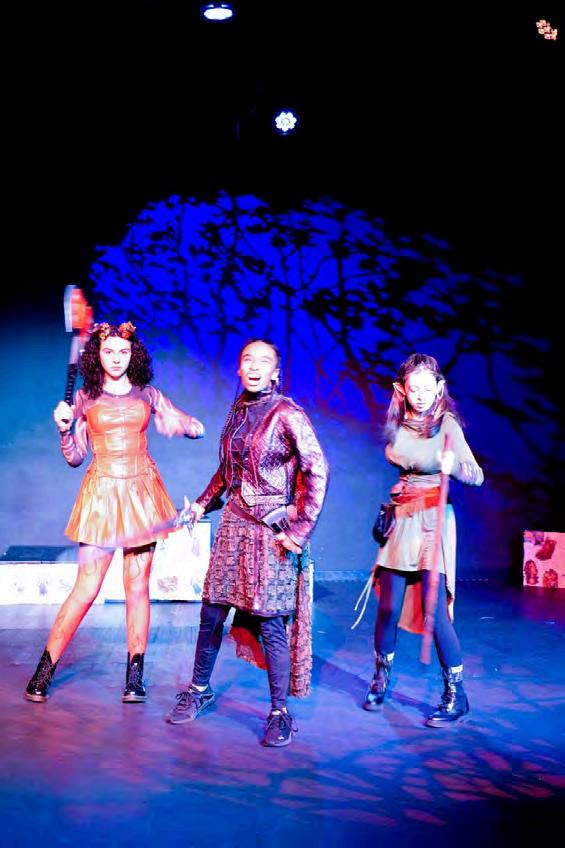
Prerequisite: Intro to Theatre or Creative Dramatics and permission from the department.
Musical Theatre is a class designed for students to learn about the history of Musical Theatre and developskillsneededtoperformthisartform.This is an advanced, performance-based class and students must be willing to engage in all elements covered: musical theatre history, singing, dancing andacting.Studentswillbeaskedtoperformvocal solos/duets/group numbers. Students will also be asked to perform in scenes and learn and perform dance combinations from shows. Students may also be asked to participate in outside public performances or school master classes. Theatre is collaborative in nature and any student interested in this course must be a positive and supportive member of this class and program. Students may take this course twice. If repeating the course, studentsaredesignatedasMusicalTheatre2.

All students, regardless of experience, are encouraged to include an art elective into their schedule so that they have an opportunity to experience the benefits an art class can bring to their creative thinking skills. All elective courses will include an art historyorappreciationcomponentrelatedtoeachtopic.
(9th, 10th, 11th, 12th - ½ cr/sem)
Students will examine the Elements and Principles of art and the role they play in designing a composition, while enhancing their understanding of the creative process. Students will be asked to engage in short small projects and exercises designed to improve their observation skill. Students will examine the painting style known as non-objective, established by the artist Wassily Kandinsky. This class is designed to help students gain a greater degree of satisfaction from other PortledgeStudioelectives.
(9th, 10th, 11th, 12th - ½ cr/sem)
Students will be introduced to the fundamentals of architecturaldesign,solveconceptualproblems,and develop an awareness of architecture’s ecological and social relationships with an emphasis on the current movement in green architecture, that is, energy efficient, ecologically kind structures. Students will develop skills in working with form and spatial relationships though sketching, model construction,andcomputer-aideddesigns.
(9th, 10th, 11th, 12th - ½ cr/sem)
Students will examine the long history of graffiti, theevolutionoftheartformanditscurrentrolein modern culture. Students will choose an alias and createavarietyofletterdesigns.Studentswillalso learn about the current street art movement and createhandcutstencils.
(9th, 10th, 11th, 12th - ½ cr/sem)
Students will explore their individual creativity throughstudentdrivenandselfdeterminedprojects. Focus will be on finding the right outlet for the student’s personal expression. All skill levels are welcome and encouraged to either develop a new skillorfurtherdeveloptheirpassion.
(9th, 10th, 11th, 12th - ½ cr/sem)
This course is presented as an introduction to ceramics. Students will learn the basics of clay constructionastheyproduceworksusingpinch,coil and slab building techniques with clay. Knowledge oftheproperuseofclaytoolsandmaterialswillbe intertwined within the creative process and an examinationoftheartform.
(9th, 10th, 11th, 12th - ½ cr/sem)
Thisone-semestercourseintroduces9th–12thgrade students to the fundamentals of media production, focusing on creating engaging daily announcements andpodcasts.Studentswillexplorevideoandaudio recording,editing,scriptwriting,andon-camera/onmicrophone performance in a collaborative, TV studio environment. Emphasizing creativity and professionalism, the course covers technical skills like lighting, sound mixing, and framing, alongside storytelling and interview techniques. Through hands-on projects, students will produce live announcements, themed broadcasts, and podcast episodes. The course culminates in a capstone project showcasing their mastery of media production, fostering teamwork, confidence, and technical proficiency in a dynamic, real-world context.
(9th, 10th, 11th, 12th - ½ cr/sem)
This course is intended to introduce students to digitalphotography.Theclasswillfocusonlearning howtooperateadigitalcameraanduseacomputer asadigitaldarkroom.Basiccamerauseandrulesof composition will be stressed. Cameras used will include basic point and shoot digital cameras, the cell phone as a camera and Digital SLRs. Photographs will be corrected and manipulated in Photoshop addressing, color correction, retouching and more. An overview of the history of photography and discussion of influential photographerswillbecovered.ADigitalSLRisnot required but highly recommended for serious students.
(9th, 10th, 11th, 12th - ½ cr/sem)
This course is an introduction to printmaking. Studentswilllearnthebasicsofprintmakingasthey explore mono-prints, lino prints, and block printing. Knowledge of the proper use of tools and materials will be intertwined within the creative processandanexaminationoftheartform.
(11th, 12th - 1 cr/yr)
Students will learn how film creates meaning and will gain the skills to develop ideas through the various stages from conception to finished production. Through the study and analysis of film texts and exercises in film-making, the course explores film history, theory, and socioeconomic background. The course develops students’ critical abilities, enabling them to appreciate the multiplicity of cultural and historical perspectives in film. To achieve an international understanding oftheworldoffilm,studentsaretaughttoconsider film texts, theories, and ideas from the points of view of different individuals, nations, and cultures. Students also develop professional and technical skills (including organizational skills) needed to express themselves creatively in film. (www.ibo.org).

(9th, 10th, 11th, 12th - ½ cr/sem)
This course introduces students to a variety of techniques and materials used in the creation of three-dimensional sculpture. Students will use both additive and subtractive methods to produce works using materials including wood, clay, paper, wire, plaster, and mixed media. Written assignments will be required in conjunction with the study of sculptors, past and present. Trips to galleries and museumsonLongIslandandinNewYorkCitymay beincluded.
(11th, 12th - 1 cr/yr)
2-year course.
IB Visual Arts Year 1 is a studio-based course exploring the students' creativity and culminating intheproductionoftwoandthreedimensionalart. Drawing, painting, sculpture, and the digital realm will be explored. Students will develop their own artwork through research and thoughtful exploration of the art making process. Students are expected to be motivated and be able to connect and relate to a variety of styles, cultures, and time periodsandmakeconnectionstotheirownpersonal art-making practice. The creative process will be documentedinjournalsinwrittenandvisualforms.
(12th - 1 cr/yr)
Prerequisite: IB Visual Arts Year 1
2-year course.
IBVisualArtsYear2isthesecondyearofastudiobased course exploring the students' creativity and culminating in the production of two and three dimensional art. Drawing, painting, sculpture, and the digital realm will be explored. Students will develop their own artwork through research and thoughtful exploration of the art making process. Students are expected to be motivated and be able toconnectandrelatetoavarietyofstyles,cultures, andtimeperiodsandmakeconnectionstotheirown personal art making practice. The creative process willbedocumentedinjournalsinwrittenandvisual forms.

The courses offered in the World Languages and Cultures Department help students learn to effectively communicate in the languages offered, while developing a strong cultural understanding and appreciation. All courses that are offered explore global issues,identities,experiences,andtheheritageofcountriesinwhichFrench,Mandarin, and Spanish are spoken. Students may orient their study towards the advanced track, which includes authentic literary texts, or towards developing their communication skillstobereadyforuseintheirfuturetravelsandstudy.
Completion of an IB Diploma requires enrollment in an IB Language B course. The Portledge graduation requirement is successful completion of a level-three course, however students are encouraged to study a language in all four years. Distinguished scholarswhoaredevotedtothestudyoflanguageandculturesmayapplyforadmission tothePortledgeLanguageHonorSociety.
AppealProcess:
If a student wishes to enroll in a language course for which they have not been recommended,theymustcompletethefollowingsteps:
Contact the teacher who made the recommendation and the Department Chair for approval 1.
Takeaplacementexamtodeterminetheappropriatecourseselection. 2.
Additionally, to maintain placement in an advanced course, students must receive a teacherrecommendation,upholdstrongworkhabits,andmeetbehavioralexpectations.
In order to meet the graduation requirement, each Upper School student must successfully complete at least 2 credits during their high school years in French, Mandarin,orSpanish,culminatinginatleastlevel3.Weencouragestudentstoenrollin alanguagecourseduringallfouryears.Interestedstudentsmaystudyasecondforeign languageasanelective.
French 1
French 2/2A
French 3/3A
French 4: Conversations & Culture
French 5: Conversations & Culture
French Year 1
French Year 2
French 1

IBFrenchAbInitioYear1& Year2areelectivesavailablefor studentswhohaveno,orvery little,exposuretoFrench. These courses do not meet the language requirements for graduation.
IB French Ab Initio Year 1
IB French Ab Initio Year 2
(9th, 10th or permission from department - 1 cr/yr) 3- year sequence required.
Permission from department required if taken as a 2nd World Language
ThisisabeginningcourseforstudentswhoarenewtolearningFrenchandforthosewhoneedonemoreyear tosolidifytheirknowledgeandusageofthefundamentals.Inthecourse,studentslearnproperpronunciation and acquire basic vocabulary, grammar, and idioms. An introduction to the geography and civilization of francophonecountriesgivesdepthtotheprogram.
French 2A
(9th, 10th, 11th - 1 cr/yr)
2-3 year sequence required.
Prerequisites: A- in the previous year’s course and/or teacher recommendation.
French2AstudentsfollowtheFrench2curriculum, with enrichment: the student must undertake the studyofmorecomplexgrammarstructures,complete additional reading and writing assignments, and do more independent work. Successful completion of the enrichment program in French 2A is a prerequisitetoFrench3A.
French 2
(9th, 10th, 11th - 1 cr/yr) 2-3 year sequence required.
In this course, students work to increase their competency in all four language skills: listening, speaking,reading,andwriting.Theycontinuetheir study of grammar and vocabulary and practice their skills in a variety of ways, such as conversations in class, activities with audio-visual materials (including feature films), oral presentations, and shortessays.Theyalsoreachadeeperunderstanding ofthecultureandhistoryofthefrancophoneworld. Successful completion of the course qualifies the student to enroll in French 3 in the following schoolyear.

French 3 (10th, 11th - 1 cr/yr)
Required course.
Prerequisite: Permission from the department.
This course builds on the content of French 2 by providingreinforcementofbasicconceptsaswellas further grammar study, emphasizing the subjunctive and conditional moods. Students build upon their vocabulary,practicewithidiomaticexpressions,and generally have opportunities to gain fluency when expressing themselves in French. By studying various aspects of French-speaking societies indepth, students begin to make subtle comparisons with their own culture and experience. In this course,wecontinueourexplorationoffrancophone literature,cinema,andnewsreports.
(11th, 12th - 1cr/yr)
Prerequisite: French 3 or 3A.
This course is a continuation of French 3 (or of French 3A for those who wish to opt out of the Advanced track), offering practice at a high beginner/intermediate level. Students will gain confidence using the language by daily practice drillinggrammarconceptsthathavebeentaughtin previousFrenchcourses.Inaddition,studentslearn the vocabulary needed to converse about the topics in the curriculum. While students do some reading (often as a class) and some writing (to reinforce their command of grammar), the emphasis is placed on oral communication. The class explores various cultural themes through short reading selections, internet websites, songs, poems, and movies. Each individual student is encouraged to investigate those aspects of the francophone world that correspondtohisorherpersonalinterests.Anopen exchange of ideas and information is a key element of the course; students will be responsible for at leastoneoralpresentationperterm.
3A (10th, 11th - 1 cr/yr)
Required course.
Prerequisite: A- in French 2A, or permission from the department.
Inthiscoursestudentsareexpectedtolearnanduse the most advanced structures possible to create authentic and sophisticated writing and speech. In addition to the exploration of the conditional and subjunctive moods (in all tenses), grammar lessons may include the aspect of adjectives, the infinitive mood,therelativepronouns,theliterarypasttense, thepassivevoiceandindirectdiscourse.Inaddition to the excerpts from our textbook(s), students will read classic French short stories as well as a novel or play, and continue their exploration of poetry and film. The work they do will develop the competencies they will need to demonstrate on the IBexams.
- 1cr/yr)
Prerequisite: French 4.
This course is a continuation of French studies offering practice at a high beginner/intermediate level. Students will gain confidence using the languagebydailypracticedrillinggrammarconcepts that have been taught in previous French courses. Inaddition,studentslearnthevocabularyneededto converse about the topics in the curriculum. While studentsdosomereading(oftenasaclass)andsome writing (to reinforce their command of grammar), the emphasis is placed on oral communication. The classexploresvariousculturalthemesthroughshort reading selections, internet websites, songs, poems, and movies. Each individual student is encouraged to investigate those aspects of the francophone world that correspond to his or her personal interests. An open exchange of ideas and informationisakeyelementofthecourse;students willberesponsibleforatleastoneoralpresentation perterm.
(11th - 1 cr/yr)
2-year course.
Prerequisite: French 3A, or permission from the department.
This course, for students who have reached the intermediate level, is part of the two year sequence in the IB program. Students enrolled in this course will prepare for exams taken in the second year of thetwoyearsequence.Studentswillexplorethemes such as science & technology, world issues, and social relationships by reading articles, poetry, and prose, listening to and watching news programs and films, and doing research projects. The grammar concepts learned in previous courses are reviewed, and some advanced grammar topics are introduced. All students will engage in tasks used in IB assessments, and thereby improve their interpersonal, analytical, and presentational communicationskillsinFrench.
(11th - 1 cr/yr)
2-year course.
Prerequisite: no more than 1 year of French.
First year in a 2 year sequence of language study. TheAbInitiocourseisofferedatSLonly.Thisisa language acquisition course designed for students with no previous experience in—or very little exposure to—the target language (for example, a student may have never studied this language previously, or may have completed no more than a Level 1 course in the language). Language ab initio students develop their receptive, productive, and interactive skills while learning to communicate in the target language in familiar and unfamiliar contexts. Students develop the ability to communicatethroughthestudyoflanguage,themes, and texts. There are five prescribed themes: identities, experiences, human ingenuity, social organization, and sharing the planet. While the themes are common to both language ab initio and language B, the language ab initio syllabus additionally prescribes four topics for each of the five themes, for a total of 20 topics that must be addressed over the two years of the course. The abilitytoworkindependentlyisimportantforthose whowishtosucceedinthiscourse.

(12th - 1 cr/yr)
2-year course.
Prerequisite: IB French Year 1.
This is the second year of the two-year sequence in the IB program. Students who select “SL” will take their exams at the Standard Level. In the second year, all students continue their exploration of themes such as science & technology, world issues, and social relationships by reading articles, poetry, and prose, listening to and watching news programs and films, and doing research projects. HL students mustalsoreadapieceofauthenticFrenchlanguage literature (for HL, a minimum of 2 works must be studied during this two-year course.) All students engage in the kinds of tasks used in IB assessments sothattheyarepreparedtositfortheexams,which are administered at various points throughout the schoolyear,culminatinginMay.
(12th - 1 cr/yr) Prerequisite: AB Initio Year 1
The second year in a 2 year sequence of language study. Language ab initio students develop their receptive, productive, and interactive skills while learning to communicate in the target language in familiar and unfamiliar contexts. Students develop the ability to communicate through the study of language, themes, and texts. There are five prescribed themes: identities, experiences, human ingenuity, social organization, and sharing the planet. While the themes are common to both language ab initio and language B, the language ab initiosyllabusadditionallyprescribesfourtopicsfor eachofthefivethemes,foratotalof20topicsthat must be addressed over the two years of the course. The ability to work independently is important for thosewhowishtosucceedinthiscourse.

Spanish 1
Algebra 1
Spanish 2/2A
Spanish 1
(9th, 10th, or special permission - 1 cr/yr) 3-year sequence required.
Permission from the department is required if taken as a 2nd World Language.
Thisisabeginningcourseforstudentswhoarenew toSpanishandforthosewhoneedonemoreyearto solidify their knowledge and usage of the fundamentals. In the course, students learn proper pronunciation and acquire basic vocabulary, grammar, and idioms. An introduction to the geography and civilization of Spanish-speaking countriesgivesdepthtotheprogram.
(9th, 10th, 11th - 1 cr/yr) 2-3 year sequence required.
In this course, students work to increase their competency in all four language skills: listening, speaking,reading,andwriting.Theycontinuetheir study of grammar and vocabulary and practice their skills in a variety of ways, such as conversations in class, activities with audio-visual materials (including selections from feature films), oral presentations, and writing assignments. They also reach a deeper understanding of the culture and history of the Hispanic world. Successful completionofthiscoursemeansthestudentisready forSpanish3inthefollowingschoolyear.
(9th, 10th, 11th - 1 cr/yr) 2-3 yr sequence required. Prerequisite: Permission from the department. Spanish2AstudentsfollowtheSpanish2curriculum,withenrichment:thestudentmustundertakethestudy of more complex grammar structures, complete additional reading and writing assignments, and do more independentwork.SuccessfulcompletionoftheenrichmentprogramisaprerequisitetoSpanish3A.
(10th, 11th- 1 cr/yr)
Required course
Prerequisite: Permission from the department. This course builds on the content of Spanish 2 by providingreinforcementofbasicconceptsaswellas further grammar study, emphasizing the different uses of past tenses, and the subjunctive mood. Studentsbuildupontheirvocabulary,practicewith idiomatic expressions, and generally have opportunities to gain fluency when expressing themselves in Spanish. By studying various aspects of Spanish-speaking societies in-depth, students begin to make subtle comparisons with their own culture and experience. In this course, we continue ourexplorationofHispanicliteratureandcinema.
(11th, 12th - 1 cr/yr)
Prerequisite: Spanish 3 or 3A.
This course is a continuation of Spanish 3 (or of Spanish 3A for those who wish to opt out of the Advanced track) designed to provide practice at a high beginner/intermediate level. The comprehensive grammar review book (Repaso, Glencoe) and on-line grammar exercises are among thecoursematerials.Inaddition,studentslearnthe vocabulary needed to converse about the topics in thecurriculum.Whilestudentscontinuetoworkon all four language skills, the emphasis is placed on oral communication. The class explores various cultural themes through short reading selections, songs, poems, and movies. Each individual student is encouraged to investigate those aspects of the Spanish-speaking world that correspond to his or her personal interests. An open exchange of ideas and information is a key element of the course; students will be responsible for at least one oral presentationperterm.

(10th, 11th, or permission of the department - 1 cr/yr)
Required course
Prerequisite: Permission from the department. This course allows students who have reached the intermediate level to practice and develop all four language skills. Students are expected to learn and use the most advanced structures possible to create authentic and sophisticated writing and speech. In addition to the exploration of conditional phrases and the subjunctive mood (in all tenses), grammar lessons may include the infinitive, special uses of the future tense, and ways of marking time. In addition to the excerpts from our textbook(s), students will become used to reading Spanishlanguage newspapers and they will be exposed to classic short stories, a novel or play, and more examplesofpoetryandfilm.Theworktheydowith these texts—which includes performing dialogues and debates, preparing topics for oral presentation, writing personal essays, and completing researchedbased projects—will develop the competencies they willneedtodemonstrateontheIBexamattheend oftheirsenioryear.
(11th, 12th - 1 cr/yr)
Prerequisite: Spanish 4 or permission from the department.
ThiscourseisacontinuationofSpanishdesignedto provide practice at a high beginner/intermediate level. The comprehensive grammar review book (Repaso, Glencoe) and on-line grammar exercises are among the course materials. In addition, students learn the vocabulary needed to converse about the topics in the curriculum. While students continue to work on all four language skills, the emphasis is placed on oral communication. The classexploresvariousculturalthemesthroughshort reading selections, songs, poems, and movies. Each individual student is encouraged to investigate those aspects of the Spanish-speaking world that correspondtohisorherpersonalinterests.Anopen exchange of ideas and information is a key element of the course; students will be responsible for at leastoneoralpresentationperterm.

(11th - 1 cr/yr)
2-year course.
Prerequisite: Spanish 3A, or permission from the department.
This course, for students who have reached the intermediate level, is part of the two-year sequence in the IB program. Students who select “SL” will prepare for exams at the Standard Level, taken in the second year of the two year sequence. All students explore themes such as science & technology,worldissues,andsocialrelationshipsby reading articles, poetry, and prose, listening to and watching news programs and films, and doing research projects. The grammar concepts learned in previous courses are reviewed, and some advanced grammar topics are introduced. All students will engage in tasks used in IB assessments, and thereby improve their interpersonal, analytical, and presentationalcommunicationskillsinSpanish.
(12th - 1 cr/yr)
2-year course.
Prerequisite: IB Spanish Year 1.
This is the second year of the two-year sequence in the IB program. In the second year, students continuetheirexplorationofthemessuchasscience &technology,worldissues,andsocialrelationships by reading articles, poetry, and prose, listening to and watching news programs and films, and doing research projects. Students engage in the kinds of tasks used in IB assessments so that they are prepared to sit for the exams, which are administered at various points throughout the school year, culminating in May. HL students must also read a piece of authentic Spanish language literature(tobeinHL,aminimumof2worksmust bestudiedduringthistwo-yearcourse.)
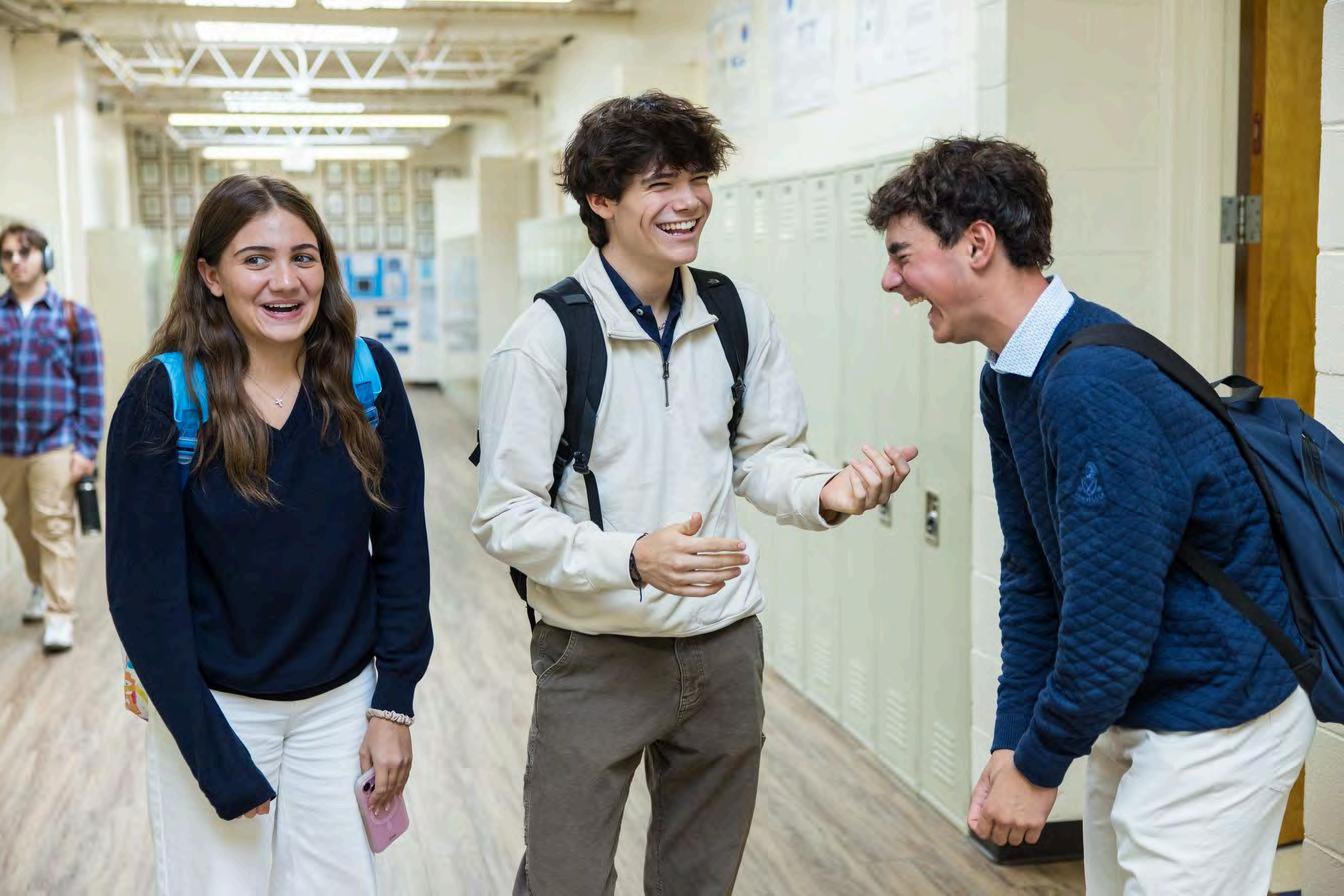

IBMandarinAbInitioYear1& Year2areelectivesavailablefor studentswhohaveno,orvery little,exposuretoMandarin. These courses do not meet the language requirements for graduation.
Mandarin 2
Mandarin 1
(9th, 10th, 11th - 1 cr/yr)
Thisisabeginningcourseforstudentswhoarenew to Mandarin and for those who need one more year of study to solidify their knowledge. Students will learn how to write in pidgin and recognize Chinese characters.Theywilldevelopproperpronunciation, acquire basic vocabulary, grammar, and idioms. An introduction to the geography and to the customs and traditions of China throughout the calendar yeargivesdepthtotheprogram.
(9th, 10th, 11th - 1 cr/yr) 2-3 year sequence required. This course for students at the advanced beginner level is designed to increase their competence in Chinese language skills. They practice through conversations in class, activities with audio-visual materials, oral presentations, and short pieces of writing. Students will also reach a deeper understanding of the culture and history of China. Successful completion of the course qualifies the student to enroll in Mandarin 3 in the following schoolyear.
(10th, 11th or permission of the department - 1 cr/yr)
ThisintermediatecoursebuildsonthecontentofMandarin2byprovidingreinforcementofbasicconcepts aswellasfurthergrammarstudy.Studentsbuildupontheirvocabulary,practicewithidiomaticexpressions, and generally have opportunities to gain fluency when expressing themselves in Mandarin. By studying variousaspectsofChinesesocietyin-depth,studentsbegintomakecomparisonswiththeirowncultureand experience. In this course, we continue our exploration of authentic materials including film clips, poetry, andnewsreports.

(11th, 12th - 1 cr/yr)
Students in Mandarin 4CC have reached the intermediate high level. The course is a continuation of Mandarin3,offeringpracticeinparticularwithinterpersonalcommunication.Studentswillgainconfidence using the language by daily practice drilling concepts that have been taught in previous Mandarin courses. Theclassexploresvariousculturalthemesthroughshortreadingselections,internetwebsites,songs,poems, and movies. Each individual student is encouraged to investigate those aspects of Chinese culture that correspond to their personal interests. An open exchange of ideas and information is a key element of the course;studentswillberesponsibleforatleastoneoralpresentationperterm.
(11th - 1 cr/yr)
2-year course.
Prerequisite: Permission from the department.
This course, for students who have reached the intermediatelevel,ispartofthetwo-yearsequence in the IB program. Students enrolled in this course willprepareforexamsattheStandardLevel,taken in the second year of the two year sequence. Students will explore themes such as science and technology,worldissues,andsocialrelationshipsby reading articles, poetry, and prose, listening to and watching news programs and films, and doing research projects. The grammar concepts learned in previous courses are reviewed, and some advanced grammar topics are introduced. All students will engage in tasks used in IB assessments, and thereby improve their interpersonal, analytical, and presentationalcommunicationskillsinMandarin.
Mandarin
(12th - 1 cr/yr)
2-year course.
Prerequisite: IB Mandarin Year 1.
Thisisthesecondyearofthetwo-yearsequencein theIBprogram(whichalsopreparesstudentsforthe Advanced Placement examination in Mandarin Language and Culture should they wish to sit for it inMay).Inthesecondyear,studentscontinuetheir explorationofthemessuchasscience&technology, world issues, and social relationships by reading articles, poetry, and prose, listening to and watching news programs and films, and doing research projects. All students engage in the kinds of tasks used in IB assessments so that they are prepared to sit for the exams, which are administered at various points throughout the schoolyear,culminatinginMay.
(11th - 1 cr/yr)
2-year course.
Prerequisite: no more than 1 year of Mandarin.
First year in a 2-year sequence of language study. The Ab Initio course is offered at SL only. This is a languageacquisitioncoursedesignedforstudentswithnopreviousexperiencein—orverylittleexposureto —thetargetlanguage(forexample,astudentmayhaveneverstudiedthislanguagepreviously,ormayhave completed no more than a Level 1 course in the language). Language ab initio students develop their receptive,productive,andinteractiveskillswhilelearningtocommunicateinthetargetlanguageinfamiliar andunfamiliarcontexts.Studentsdeveloptheabilitytocommunicatethroughthestudyoflanguage,themes, and texts. There are five prescribed themes: identities, experiences, human ingenuity, social organization, and sharing the planet. While the themes are common to both language ab initio and language B, the language ab initio syllabus additionally prescribes four topics for each of the five themes, for a total of 20 topics that must be addressed over the two years of the course. The ability to work independently is importantforthosewhowishtosucceedinthiscourse.

Non-Corecoursesareconsideredsupplementarytothenormalcourseload.Thecredits awarded for successful completion are not counted toward meeting the 18-credit minimumgraduationrequirement.Similarly,gradesearnedinnon-coreelectivesarenot factoredintothecomputationofplacementontheHighHonors/HonorsList.
(9th, 10th, 11th, 12th - ½ cr/sem)
Pass/Fail.
Can be taken multiple semesters if applicable. Thisnon-coreelectiveprovidesanin-depthstudyof the game of chess from a science, art, and game perspective.Usingchessastheprimaryconduit,the class provides an effective means for intellectual development and logical thinking. Students learn its rules, notation, use of the chess clock and basic chess principles, as well as strategy, tactics, and endgame play. The class reinforces essential problem-solving techniques through lectures and discussion, followed by tournaments and match situations,andadvancedgametheory.
(9th, 10th, 11th, 12th - ½ cr/sem) Pass/Fail.
This course will serve as an introduction to the theory and practice of Childhood Education. Students will examine the intellectual, social, and physical development of children, and learn the skills needed to create and maintain an effective and safe learning environment. Upper School studentswillbematchedwithclassesintheMiddle School and/or Lower School for the purpose of observing, analyzing, reflecting, and supporting the lead teacher. They will also be required to create and teach a lesson plan of their own. Additionally, students should be prepared to be an active participantthroughcollaborationwithpeers,active reflectionanddiscussionabouttheirexperiencesin theclassroom,andresearchandthepresentationof various dimensions of Middle and Elementary School Education (philosophies, learning abilities, globaleducationalsystems,etc.).
(9th, 10th, 11th, 12th - 1 cr/yr)
Prerequisites: Introduction to Chess or permission of instructor.
This full-year course is designed for students who intend to become rated or highly-skilled players. Therewillbe3levelsofAdvancedChess:1,2,and 3, all offered as separate classes that can be taken whenthepreviousleveliscompleted.Level3isthe highest level chess class and will cover advanced themes normally studied by serious tournament players.Allaspectsofchesswillbecoveredinthe3 classes including detailed opening systems, middlegame themes and endgame theory. Students will be assessed on a regular basis with daily homeworkassignments.Theuseofchessclocksand score keeping will be required. Players will be encouraged to compete in local rated chess tournaments. Students will each obtain online accounts at both Chesslang and Chess.com where progress can be monitored. Students in this class will potentially become members of the U.S. Chess Federationandobtainnationalranking.
(9th, 10th, 11th, 12th - ½ cr/sem)
This course will serve as an introduction to American Sign Language and Deaf Culture in general. Students will be instructed by a teacher employed by Mill Neck School for the Deaf. Class sessions will occur both on Portledge School’s campus and on Mill Neck School for the Deaf’s campus.Traveltoandfromwillbeprovidedforby Portledge.

A required non-credit course. This10th-graderequiredclassisdesignedtoaddress common challenges high school students face as well as provide information about fundamental topicsinordertobeasuccessfulPortledgestudent. It is Portledge School’s belief that adolescents are able to make appropriate and healthy decisions when they are afforded the space for self-reflection when confronted with difficult situations and ethical dilemmas. Classes will be taught through a variety of formats around topics including, but not limited to: mental health, nutrition, substance use, human sexuality and healthy relationships. This class enables students to critically think, converse, andreflectontheseissueswiththeirpeersinasafe and engaging manner of discussions, lectures, activities, and media content which will set them up for a successful and healthy teenage and PortledgeUpperSchoolexperience.
This non-core offering involves students in every aspect of the production of Collage, the Portledge Yearbook. The book is produced through desktop publishing utilizing InDesign and Photoshop software.Studentsareinvolvedinplanning,layout, text, photography, advertising, meeting deadlines, and exhorting all members of the Class of 2026 to becomeactivecontributorstovariousaspectsofthe Yearbook. Yearbook staffers are required to be available to work on the book for a minimum of 3 periods per week. Weekend and after-school participation may be required at times. Enthusiasm, perseverance, organizational and time-management skills are all prerequisites for this endeavor. It’s fun!


Physical Education (9th, 10th, 11th, 12th)
A required non-credit course.
Eachsemestereachstudentmustfulfillastate-mandatedphysicaleducationrequirementbyparticipating inavarsitysport(orjuniorvarsityifavailable),anin-schoolPEclass,orbygettinganexemption approvedbytheAthleticDirector.
PhysicalEducationCourse:ThePhysicalEducationcurriculumisacombinationofbothphysicalfitness andsports.Thefitnessunitshelptodeveloplifelongfitnessskillsthatwillbeusedthroughoutlifeandwill explore-strengthtraining,andyoga.Thesportsunitsworkonskilldevelopmentinavarietyofsports.
Crew (Co-Ed)
Cross Country (Co-Ed)
Soccer (Boys)
Soccer (Girls)
Tennis (Girls)
Volleyball (Girls)
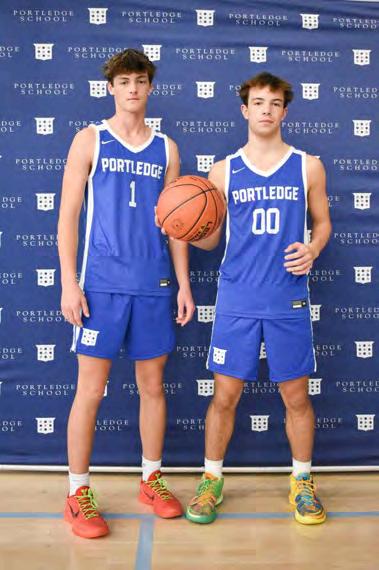
Basketball (Boys)
Basketball (Girls)
Hockey (Boys)
Hockey (Girls)
Squash (Co-Ed)
Badminton (Co-Ed)
Baseball (Boys)
Softball (Girls)
Golf (Boys)
Golf (Girls)
Lacrosse (Boys)
Lacrosse (Girls)
Tennis (Boys)
Track (Co-Ed)
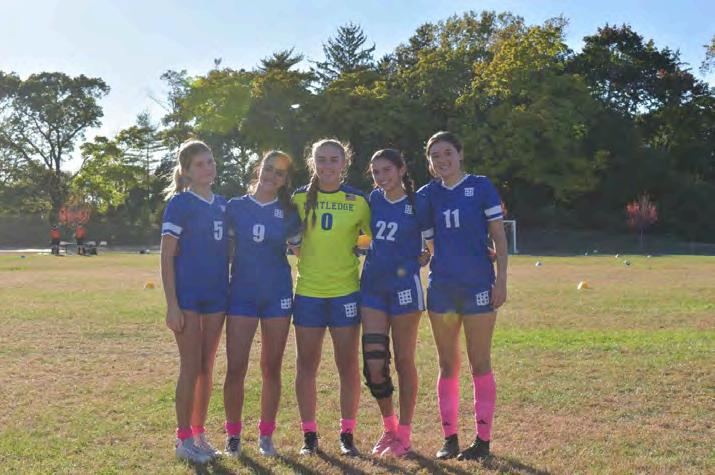
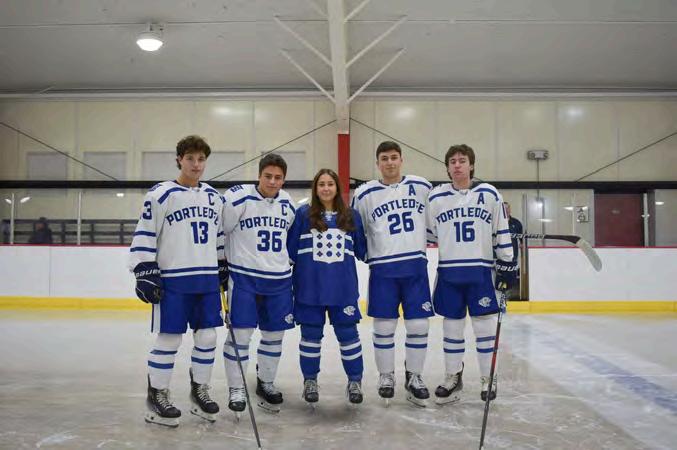

TheArtsScholarprogramisamulti-yearprogramofstudyfocusedontheTheatreArts, Visual Arts, or Music at Portledge School, and is open to students in grades nine through twelve. Students interested in participating in the program must fill out an applicationandsubmitittotheappropriatedepartmentforapproval.Onceacceptedinto theprogram,astudentisconsideredanArtsScholarcandidate.
A Music Arts Scholar must demonstrate a commitment to choral or instrumental music by participating in a performing ensemble during each school year of his/her Upper School career.
A Music Arts Scholar must elect at least one academiccourseinmusic.CoursesincludeMusic Survey/Music Theory 1, IB Music SL and HL, Digital Music and Recording. All courses are basedonenrollment.
AMusicArtsScholarmustparticipateinatleast one spring NYSSMA Solo Evaluation Festival at Level IV or higher during their Upper School careerandearnaratingof“good”orbetter.
A Music Arts Scholar’s cumulative average for allmusiccoursestakenmustbeaboveaB+.
A Music Arts Scholar must be a positive, contributing musician with a good record of lessonattendance.
A Music Arts Scholar must attend, or perform in,theMusicalShowcase.
Arts Scholar designation will be conferred by voteofthemusicfacultyuponcompletionofthe requirementsinthesenioryear.
A Theatre Arts Scholar must demonstrate a commitment to participating or performing in at leastoneUpperSchoolplayormusicaleachyear oftheirPortledgecareer.
A Theatre Arts Scholar must take at least two (2)academiccoursesinTheatre.Coursesoffered are Intro to Theatre, Technical Theatre, Creative Dramatics, Musical Theatre, or IB Theatre.
A Theatre Arts scholar must be an active member of the Drama Club for at least two (2) yearsandbewillingtoparticipateinworkshops, field trips, fundraisers and other theatrical activitiesonandoffcampus.
A Theatre Arts Scholar’s cumulative average for all Theatre courses taken must be no lower than B+.
A Visual Arts Scholar must complete a minimum of two elective credits (four one-semester courses) in VisualArtsduringtheirfouryearsofUpperSchool.
A Visual Arts Scholar’s cumulative average for all visual art courses, must be no lower than B+. The transcriptsofstudentsenteringPortledgeafter9thgradewillbereviewedtodeterminewhetherprevious courseworkmaybeappliedtowardsfulfillingtheArtsScholarrequirementsforvisualarts.
Beginning in 9th grade and continuing through 12th grade, a Visual Arts Scholar candidate must participate in both the winter and spring art exhibitions each year. A candidate may fulfill this requirementifcurrentlyenrolledinanartelectiveduringthedateoftheexhibitionoralternatively,by submitting one or more works, created independently, to an art department member for approval and inclusionineachexhibition.
AVisualArtsScholarmustsubmitaworkofartforconsiderationintheannualHeckscherMuseum“Long Island’s Best”, juried art competition at least once during their Upper School years. Priority is given to senior Art Scholars.cThe guidelines for this high school juried art competition are shared on the HeckscherMuseum’swebsiteandmaybereviewedwithUpperSchoolartteachers.

The STEAM Scholar Program is a planned, multi-year program of study in Science, Technology,Engineering,ArtsandMath;itisopentoallUpperSchoolstudents.
Overview
SpellSTEAM:"STEAM".SstandsforScience,TforTechnology,EforEngineering,A forArt,andMforMathematics.Selectonecoursefromeachcategory,earningagrade of B or better; acceptable courses are listed below. Fulfill additional requirements as listed.Electivescanbehalf-yearcourses.
Science
APscience
IBscience
Science Research (only one Research course counts)
PhysicsMechanicsA
Astrophysics
SeniorSeminarinGeology
Otherscienceelectivessubjecttoapproval
Engineering
DigitalEngineering(notcurrentlyoffered)
ArtificialIntelligence
Second different Technology course (e.g., only oneRobotics,Chess,orResearchcoursecounts)
Mathematics
Calculus
APMath
IBMath
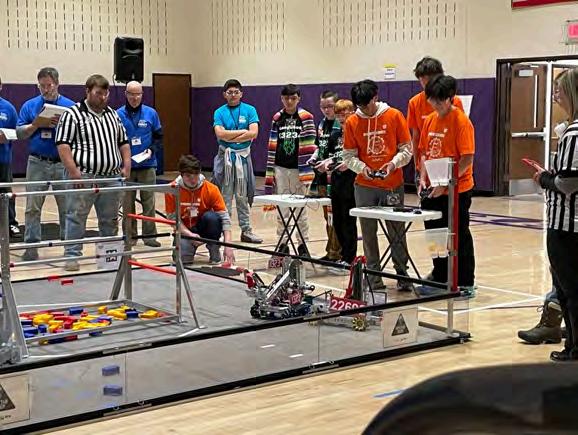
Technology
ComputerSciencePrinciples
IntroductiontoProgramming
IBDigitalSociety
Robotics(onlyoneRoboticscoursecounts)
GreenArchitecture
WebsiteDevelopment
Chess(onlyoneChesscoursecounts)
Science Research (only one Research course counts)
Art
VisualArts
Theater
Music
Inform Dr. Muratore of your intention by the beginningofyourjunioryear.
STEAM-related presentation (e.g., musical performance, art display, participation in Science Symposium). Recommended by the end ofjunioryear.
STEAM-related community service, such as mentorshipofotherstudents.


TheIBDiplomaProgrammeisaplanned,two-yearprogramofstudyopentoonly11th and12thgradeUpperSchoolstudents.MostIBDiplomaProgrammecourseslistedbelow aretwo-yearcourses,withafewexceptions.
Each IB World School operates within the boundariessetbytheIB,includingtheabilityto co-seat Standard Level (SL) and Higher Level (HL) exam students. SL and HL designation referstothelevelofcontenttestedattheendof the course. IB Diploma Candidates must sit for six exams and/or complete portfolio pieces for submission at the end of the course of study. A balance of at least 3 HL subjects and 3 SL subjectsisneededtoearnaminimumpointtotal of24(examsarescoredona1-7scale),withat least9pointsearnedinSLexamsandatleast12 points earned from HL exams. (Students can sit for four HL exams with permission from the IB Coordinator.) In addition to the six courses of study,IBDiplomastudentscompletetheIBCore (seebelowfordetails).
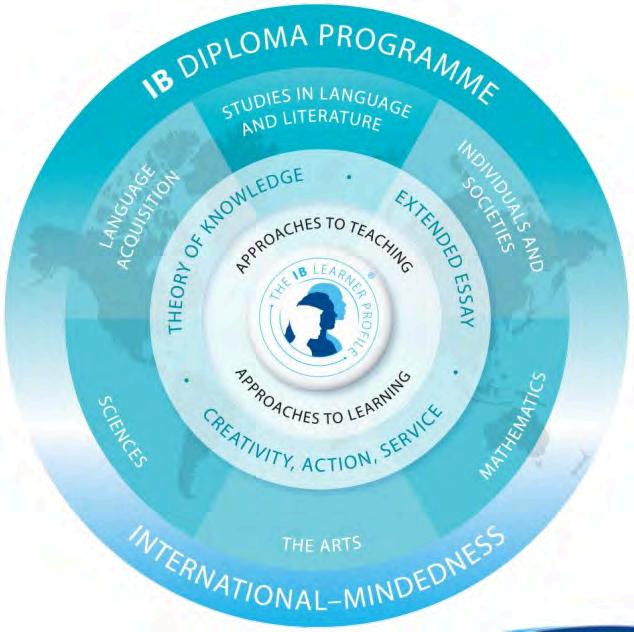
AtPortledgewevalueagrowthmindsetandencouragestudentstopushthemselvesto learn aspects of a discipline they may not otherwise have exposure to. IB courses at Portledgearepopulatedbyourstrongeststudents,andtheywillexperiencebothSLand HLtopicsinthefirstyearofalltwo-yearcourses.*Thisallowsstudentstogaininsight andtomakeaninformeddecisionregardingexam-levelchoice.
Incertaindisciplinessuchasmath,science,worldlanguages,andtheartsstudentswill “declare” their SL or HL exam choices at the end of the first semester in the junior year.ThesechoicesaredeclaredinEnglish,andhistoryatthestartofsenioryear.This practice is to best prepare students for the internal assessments associated with each class,astheymaydifferbetweenStandardandHigherLevels.TheIBCoordinatorwill conferencewithallteachersandstudentstoconfirmtheappropriateexamplacement.
ItisalsoimportanttoemphasizethattheIBProgrambuildsontherigorouscurriculum already established at Portledge. As a result, some HL topics will be covered and assessed,evenafterstudentsdeclaretheirexamtrack,asweaimtoprepareallofour studentsforcollege-levelwork.

The following is the most updated list of courses offered as SL/HL:
IBBiologySL/HL-2-YearCourse
IBPhysicsSL/HL-2-YearCourse
IBHistorySL/HL-2-YearCourse
IBEnglishLiteratureSL/HL-2-YearCourse
IBWorldLanguageBSL/HL,offeredinSpanish, French,andMandarin-2-YearCourse
IBMathematicsApplicationsandInterpretations
SL/HL-2-YearCourse
IBMathematicsAnalysisandApproachesSL/HL -2-YearCourse
IBVisualArtsSL/HL-2-YearCourse
IBTheatreSL/HL-2-YearCourse
IBMusicSL/HL-2-YearCourse
This class is scheduled during the fall semester. Automatically added to schedule for Diploma students. Open to Diploma students only. IB Core is a mandatory course for all IB Diploma Candidates. Students are introduced to three components of the IB Core: Theory of Knowledge, the Extended Essay, and Creativity, Activity, and Service (CAS). Internal and external assessments are addressed over the two-year course (scheduled first semester of junior (IB Core 1) and senior year (IBCore2)).
The extended essay introduces students to the demandsandrewardsofindependentwork.Emphasis is placed on doing personal research and communicating ideas effectively to write a 4,000word essay in an area of personal interest. The process of choosing a subject, topic, revising a research question and working with an advisor to guide the experience begins in IB Core Y1 and is completedbytheendofIBCoreY2.Thecompleted EEissubmittedtotheIBforexternalevaluation;a passingmarkisnecessarytoearnthediploma.
The following are offered only at the Standard Level:
IBFilm-1-YearCourse
IBEconomics-1-YearCourse
IBDigitalSociety-1-YearCourse
*IB Environmental Systems Studies - 2-Year Course
*IB Sports, Exercise & Health Science - 2-Year Course
*IBFrenchabinitio-2-YearCourse
*IBMandarinabinitio-2-yearcourse
TOKisaninterdisciplinarycoursedesignedtohelp students question and understand how they know what they know. Students study how individuals from various disciplines view the world in order to develop their own ways of thinking. By stimulating analysis of knowledge across disciplines, TOK seeks tohelpstudentsmakesenseofschoolandtheworld. During IB Core Y1 students complete a TOK exhibition which is internally assessed. In IB Core Y2, students will produce a TOK essay in response to one of six prompts. The paper, which is about 1500 words, is submitted for external evaluation, a passingmarkisnecessarytoearnthediploma.
CAS is an experiential learning component of the DP. Students complete a wide variety of extracurricular, community service and athletic options to fulfill this requirement. These experiences, which begin in earnest during junior year culminate toward the CAS/Senior Project which all Portledge seniors participate in. The completion of the project is a Portledge graduation requirementaswellasarequirementtoearntheIB Diploma.
